

| This area has been dedicated to the state our United States "home" is in this day and age. We are all (and still) faced with uncertain economic and political times, especially after the fateful day of September 11, 2001 and many subsequent events including disasters, failing economies, outsourcing, and fuel costs to name a few. On this site, many examples, personal and political, will also be portrayed ranging from crime and immigration to "murphey's law"! The graphics on this page are for a tribute to and remembrance of major events that took place and / or to honor our US heroes including our brave men and women fighting for our freedom. The September 11 terrorist attacks are portrayed here on a scale so large that it was able to be seen from space. A section also portrays the disintegration of the space shuttle Columbia and unfortunate loss of its crew on February 1, 2003. Other portrayals of honor and wartime issues will be tributed on this page. God Bless America! Note - This page may take a while to load on some SLOWER connections! |
 Wasting A Scammer / Robo-Caller's Time (Nov 2019)
Wasting A Scammer / Robo-Caller's Time (Nov 2019) Disturbed / Drug-Influenced Man On Chicago CTA (June 2021)
Disturbed / Drug-Influenced Man On Chicago CTA (June 2021) Example Of Gas Price Gouging (Dec 2018)
Example Of Gas Price Gouging (Dec 2018) Nuclear War's Worst-Case Scenario (Nobody "Wins")
Nuclear War's Worst-Case Scenario (Nobody "Wins") Not Voting Because It Does Not Matter (2012)
Not Voting Because It Does Not Matter (2012)

The first thing we all think about when we hear "Post Traumatic Stress Disorder" (or "PTSD") is the disturbing recollections and feelings war veterans (especially those who served during the Vietnam War) get. Put simply, PTSD is a serious anxiety disorder that affects many people including those far from the battle field. Besides the threatening and helpless emotions of warfare and terrorism, there are many more causes (some very subtle) of PTSD, ranging from natural disasters to domestic abuse.
People suffering from this condition usually develop it following a traumatic or violent event. The event is commonly "relived" through intrusive, recurrent recollections, flashbacks, and nightmares. The symptoms can be severe, involving feelings of alienation, rage, or guilt. Some sufferers have even succumbed to suicide. PTSD can be chronic (lasting for years / on and off), or acute (usually for up to a few months) after the traumatic event. It is a real and serious mental (neurotic) anxiety disorder and should be addressed.
I will begin with a few examples of people I have witnessed suffering from PTSD. The first example was in my college years (late 80's) with an older gentleman I worked with in the pizza delivery shop. He was a veteran of the Vietnam War, and took a shot leaving him disabled. He left the military with Purple Heart honors. The disability caused by the gunshot injury was not the most debilitating of his problems. As a prank, and a rather cruel one at that, the manager their jumped up and popped a paper bag across from where the veteran was sitting.
In addition to being startled (as I was too), the man dropped to his knees and started shaking. He covered his ears, then covered his leg (where his wound once was), and started whimpering softly. We thought it was a heart attack or something, but after a few minutes he came around, and had to go out for a walk, and actually wound up going home early. The following day, he was in much better spirits, and explained to us that the reason why the bag popping bothered him so much was "because" he was "hit when he was in the war". Most likely, the effects of this "traumatic event" were "relived", and the popped bag "triggered" it ... To the point he may actually have felt physical pain, with or without the fear as if he was being shot "again".
Another case was with a friend of mine who was out at a buddy's place for "movie night" and drinks. It was around Halloween and we were watching some re-runs of the classic horror movies, "Amityville Horror II the Possession", to name one in particular. Being an older B rated horror story about evil and ghosts, it was set in a suburban Italian family with a blue collar husband, stay-at-home mom, and children. Rather apart from the main theme of the movie, there was a scene where a man in the family strikes his children with a belt. The mom attempts to intervene, yelling and ultimately being belted herself, falling down and crying as the man continues to beat the children as some rush to her aid.
Yes, it was a violent scene, but "just a movie", right? Well, my friend continued to stare at the screen, with glazed eyes and "frozen", and soon began shaking. The next scene came and went, and he continued to shake and stare, and "ignored" someone offering him a beer or popcorn. In a few minutes he snapped out of the "stare", slowly and quietly got up, and walked to the guest room and laid there. He continued in there, shaking and occasionally sobbing, for about an hour. We didn't know at first why he got like that, and why he was so affected.
He eventually left and said "something came up ... I need to go" and left, trying as hard as possible not to "look" rude or alarm anyone. He wound up leaving, obviously still highly distraught and "not focused", to the point of forgetting that he left his camera on top of his car when pulling out (he put it there when opening his car door to free his hand). The next day he asked if he left his camera at my buddy's place, but unfortunately, it fell off the car when he drove off, and it broke. This amounted to an additional $500 or so hassle for him because of the broken camera.
We took the time to talk to him and he freely admitted WHY he acted the way he did, as if he wanted help and knew well he had a problem he could not control. He pointed out the scene in "that movie", something I had trouble even remembering at the time. He told me he felt like he was back in his "old house" in New York, and about his abusive father. He felt the SAME emotions of what he went through as a child, almost to the point he felt physical pain, fear, and sick to the stomach at the SAME time. He even mentioned he smelled "cigarettes" as he relived that event, as his abusive parents smoked. No one at my buddy's place smokes.
He also could not get the sound of the angry woman in the movie "out of his head" for hours because it sounded "so much" like "my mom did" during a really bad physical confrontation between his childhood parents right before they got divorced. He also was extremely angry, and mentioned "I bet those poor kids in that movie will grow up to become a criminal instead of a pilot". Finding out about his camera he forgot also made him very agitated, but he seemed to be more upset about him forgetting it atop his car because his "mind was not clear" than the cost of replacing it.
Lastly is a victim of sexual abuse by his babysitter as a child. This case is explained in great detail in the section below for SEXUAL ASSAULT. In this case, the victim was sexually abused and grew up subconsciously blaming himself and his looks for being rejected in social situations (such as dating). Quite possibly a variant of PTSD, albeit a less "conscious" one, but having the symptoms of "alienation" and (especially) "rage" being acted out to the point the victim would vandalize property after being rejected by someone who did not want to go out with him.
Just a few cases of people with post traumatic stress disorder. Apart from war and military violence, these additional causes can case PTSD (especially in children): Domestic violence (victim or witness of), abuse (sexual or physical), traumatic events (such as a car accident or plane crash), terrorism (such as 9/11), foster care (adults), natural disasters, or being threatened (such as being held hostage or escaping from where people were murdered). As to no surprise, drugs and alcohol are often abused to a PTSD sufferer, causing potential health problems and exacerbating the anxiety.
PTSD can range from mild to severe. In mild cases, there may be no more than a few easily "shrugged off" type memories making the PTSD easily manageable without professional help. More serious cases can have bad social and even physical consequences, including destroyed friendships and relationships (mental "stigma"), health problems, drug and / or alcohol abuse (and all those problems it may cause, including DUI / accidents), self loathing, disruption of work (including the victim quitting or being fired from the stress), and - in really extreme cases - depression and suicide. Get professional help if PTSD disrupts your life in ANY way!
Many forms of psychotherapy have been suggested for trauma-related issues such as PTSD. These include cognitive behavioral therapy, meditation (relaxation), prolonged exposure therapy, interpersonal psychotherapy (social support), and medication (such as Prozac). The main focus is to "de-sensitize" the victim from the traumatic event (as well as anything triggering a recollection to it).
Definition (from WIKIPEDIA): SEXUAL ABUSE, also referred to as "molestation", is the forcing of undesired sexual behavior by one person upon another. When that "force" is immediate, of short duration, or infrequent, it is called SEXUAL ASSAULT. The offender is referred to as a sexual abuser or (often pejoratively) "molester". The term also covers any behavior by any adult towards a child to stimulate / arouse the adult (or child) sexually. When the victim is younger than the age of consent (such as under 18 in most of the USA), it is referred to as CHILD sexual abuse.
This section discusses the SEXUAL aspect of abuse, as there are many forms of abuse, such as child abuse (non sexual violence towards a child) or domestic abuse (abuse between spouses or partners living together). The term "abuse" by itself is a highly general term and refers to any sort of mistreatment and harm, whether it's physical (such as hitting someone), emotional ("hurting" someone’s feelings), or even mental (such as harming one's attributes such as self esteem and / or inducing fear / threats). The latter (mental) is the most serious of the three types of abuse, but any abuse can involved any or all three.
Sexual abuse, unfortunately, is very common among children. It can have extremely serious consequences, especially stemming from the mental aspect of the "damage" done by such abuse, which can last for many years. This often seriously affects the victim's future life, especially in socially sensitive environments (such as relationships, friendships, job security, etc). Aggression (forceful, hostile or attacking behavior) is very common amongst victims of abuse (especially sexual); with such rage extending long after the abuse has ended. Most prisoners / inmates claim they have been sexually abused during their childhood.
I have seen first-hand the effects of sexual abuse and how it affected one's life. I will explain this in second-person account, as I will not reveal any names. BE WARNED - Some of this material may be DISTURBING - So read with discretion! The victim (in this example) experienced at least 3 separate cases of sexual abuse during his early life, from when he was between 4 and 6 years old. The first case was from his older cousin, then another from a chaperone at his day camp, and another from his baby sitter. The day camp and babysitting incidents also were accompanied by physical violence, mental abuse, and / or threats. The victim in this case told his parents about the abuse in all three cases.
Unfortunately, despite the parents finding out about these incidences, not much was immediately done about it (lack of proof, hard to "catch" in the act, etc). The case of abuse by the victim's older cousin was simply shrugged off by the perpetrator’s father, with fear of his wife finding out. The day camp incident was also "brushed" off, but the same chaperone was later arrested for another form of violence (pushed a child down a hill). The babysitter's parents were notified, and she never worked in that "field" again, but I am not sure of any arrests / charges. The babysitter, according to the victim, was the most memorable (and horrific) of the three abuse cases.
The victim reports that the babysitter abused him sexually, physically, and mentally. He was "touched" in his private areas, but told "she did not like him" just before performing sexual acts on his disabled brother. When the victim asked her "why" she was "playing" with his brother, she became enraged, and punched him in his genitals, and screamed "because you’re ugly and NOT my type"! After that, she continued back with the victim's brother, slamming the door to his room shut. In this case, the sexual abuse involved TWO people (the victim AND his disabled older brother), and involved mental (rejective) and physical (punching) abuse as well.
The victim's brother, disabled and rather incoherent, exhibited little after effects from this incident with the baby sitter later in his life. The primary victim did not become violent later in life, but developed a temper and very self loathing type of behavior - Especially in socially demanding situations, such as a failed date, lost job, or poor friendship. The victim grew up and spent his early adulthood in and out of depression, not knowing the "sources" of the depression. He was an otherwise friendly, shy, and somewhat successful businessman. To this day, he has been turned down by many people he tried to date, and is still single.
This is just ONE example, and yes - it's hard to read - Of a case of sexual abuse. Many other people are not as "lucky" as this person. Many people who were abused "especially sexually" during their childhood don't grow up to be "businessmen" or depressed single professionals. Many commit violent crimes, or even acts of abuse themselves, and many of them wind up in prison for a long time. In prison, with many inmates realizing this, a person convicted of abusing a child is often the first to fall victim of a 'shank' by his fellow inmates! Otherwise, many criminals who make our lives miserable are victims of some sort of abuse (or neglect).
No - It's NOT OK ... If you see something like this happening to a child, listen carefully and report it to authorities - NO MATTER how "small" it may seem. Children often hide such experiences, in fear of revenge (from "ratting" out on the perpetrator). If you see something out of the ordinary, ask and talk to your kids about it! Young children, when comforted, usually will not lie about such abuse. Often, anyone getting caught / arrested for sexual abuse is required to register as a "sex offender" and usually faces long prison terms, on-par with manslaughter or even murder.
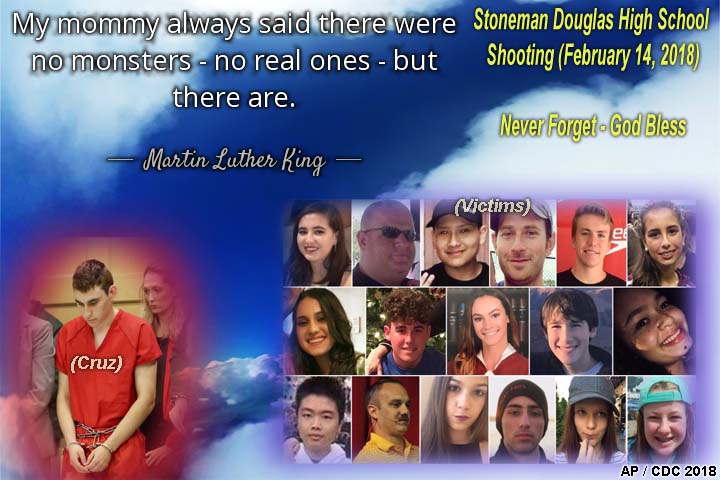
Tragic shootings continue across the USA as of 2018 - The most recent being very close to where I live in Broward County, Florida on Valentines Day (February 14) in 2018 at the Stoneman Douglas High School in Plantation, Florida (claiming 17 innocent and young lives). Crazed Nikolas Cruz (age 19) was the shooter in this cowardly act, using an AR 15 assault rifle. This raises the question on not only gun control, but assessing the severity and dangers of mental illness. Very little is being done to combat mental illness and provide help for mentally ill people, and if guns are banned, other means of terrorism or violence will be sought (such as bombs, vehicles, etc. used as "weapons"). This is the latest in a long list of shootings and terrorist acts (including those at the Pulse Night Club in Orlando, the Fort Lauderdale Airport, and Las Vegas to name just a few). These acts are doing nothing but invoking anger and a ghastly fear in almost every American. God help is all.
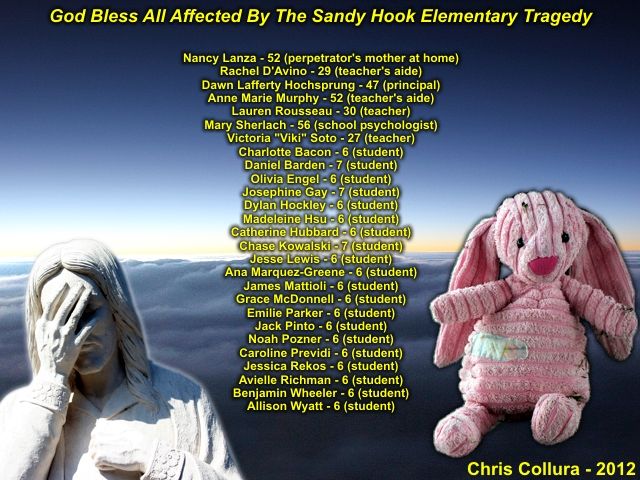
No words can describe the horrific tragedy that happened at the small Sandy Hook elementary school on December 14, 2012. For someone to do this is beyond words - All we can do is pray for these HIGHLY unfortunate victims and hope for some changes in the way people live their lives with such violent intentions. I cannot comment anymore on this - Sigh (why KIDS?) - Seeing even our US president (Barack Obama) crying was a bit too much. Sometimes I really wonder where the fine line between God and the "Devil" really exists. This latest shooting shadows yet other "smaller" ones, such as just a week or so earlier in Oregon, where 2 people were killed.
On December 14, 2012, gunman Adam Peter Lanza (age 20) first killed his mother (Nancy Lanza, aged 52) with a rifle in their Newtown home. After that, Lanza drove his mother's car to the Sandy Hook Elementary School and shot out the front door at 9:35 AM EST to gain entry. Once inside, his killing spree took out an additional 26 people, including 20 children (many of them 6 only years of age) and 6 staff. Two others escaped wounded. After a mere 14 minutes and 100 unloaded rounds, Adam Lanza turned the gun on himself, and committed suicide.
Sandy Hook Elementary sits in the quiet and normally crime-free and charming town of Newton, Connecticut. Adam Lanza also was a seemingly quiet person with mild autism, and no violent criminal history. His mother was an avid gun collector. The truly frightening and gut-wrenching results of such a "person" like Adam Lanza is that all of this tragedy came without any warning and no apparent motive. It almost seems as if this person was taken over by some highly "evil" entity. I really believe that "evil" sometimes can (and does) enter our "world".
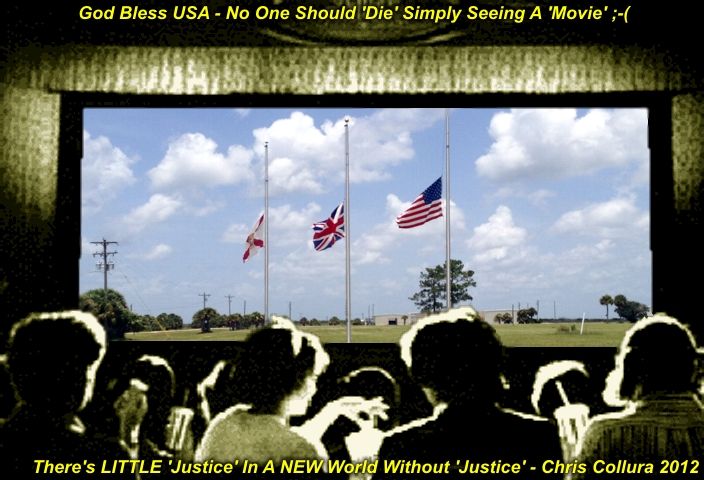
On July 20, 2012, and less than six months before the devastating and more recent Dec 14 Sandy Hook massacre, an equally violent shooting unfolded in an Aurora Colorado movie theatre. This tragic event, similar in many ways, claimed 12 lives and injured 59 people (many of those with permanent disabilities and "wishing" they did not survive). Shooter James Eagan Holmes was the culprit, but did not kill himself after the shooting. He was arrested and made several suicide attempts during his trials. Holmes had no previous criminal history.
Simply going to 'dinner and a movie' and ending up dead (or disabled) is something that strikes fear in any "normal" person. As a tribute, the composite image above was put together, and shows the flags at my skydiving facility at half mast, overlaid to a stock image of INNOCENT folks at a movie - I HOPE this gets some sort of message across. Things like this should simply NOT happen - But they do.
So we all wonder - What can we do to prevent these heinous acts (or protect ourselves)? Not seeing the warnings is very scary - Indeed. Gun control? Not so sure about that - Whether legal or not, someone WILL get their hands on a firearm if they are willing to use it. The big thing is the person USING the weapon, is he or she a normal person, with a conscience? Or is he or she capable of murder? I strongly believe that mental / psychological research (and MORE importantly - Treatment) would prevent far more deaths than changing gun laws! Have you looked at your medical coverage? Do you notice how "mental health" issues are usually limited (or not covered at all)? Think about it.

We all refer to the "American Dream" as the USA being a place to live, work, and enjoy in a care-free manner - At least that was the concept a LONG time ago, especially back in the 17th and 18th centuries. Modern times in the United States (and many other places) in 2012 have faced a frightening feeling of unsecure finances, shattered dreams, and a nightmarish way of life marked by high stress, military conflict, ruination of things we love, and ruder people. The cost of nearly every commodity - especially food and fuel - continues to go UP. The job market is tighter, more stringent, and more stressful (for those lucky enough to even HAVE a job). More and more political conflicts, a president who broke promises, and natural disasters on the rise. For example, many people in the USA can no longer say "I wanna live in San Jose" - The honest truth is "Can I AFFORD to live in San Jose?" ... What the heck is going ON? What can we do - Any ideas?
I personally have experienced major changes in my "job security" the past 10 years or so. Outside of being down right laid off (or even fired) - and later finding out my "replacement" was hired for LESS than what I was making and / or he (or she) was doing MY JOB as well as theirs - I had to adjust to this mayhem. I started contract type jobs, only 3-6 months long, to get through the rough times. Knowing how BAD it was, I NEVER lived paycheck to paycheck ... I always put money aside WHEN I was working. Many folks in the USA don't do this, so when they lose their job, they also lose their house, their car, their family (from tensions), and such.
Believe it or not, I have invested more than a YEARS worth of my salary just in case, avoiding volatile stocks, and keeping my financial overhead very low (car paid off, low rent, credit cards current each month, no interest, etc). One job was so stressful for me, it was causing me health problems and misery, and I HAD to quit. I was doing the jobs of about 3 people at an IT company, including support, with a stressful and uneven work-flow, sometimes juggling 8 or 9 projects and deadlines at a time with constant interruptions, and a dissatisfied and highly abrasive boss who did not have the financial resources to hire any more help. Had I not had my "financial backup" when I resigned, I would have been forced to stay, and maybe would have eventually had something like a disabling heart attack (or even worse)!
Imagine going through a stressful job and living paycheck to paycheck? You CAN'T QUIT, but you also CAN'T take it anymore. Imagine such an understaffed company unable to make ends meet. The company starts losing customers, and people quit, or are fired because of the stress. Eventually, the company closes altogether, or either radically downsizes, relocates, merges, or outsources their help overseas (India, Philippines, etc). All in all, the employees are forced to unemployment, and difficult changes, and / or loss of their financial security had they not planned for it. Time after time, in a recessional period, it happens - companies close and people lose their source of income.
The second big problem, besides the American workforce, is inflation (and during 2009 to 2012, we saw the combination of a slow-to-recover recession AND inflation). Petroleum fuel prices, caused by tensions in the Middle East and market lobbying, have gone up to all time highs. This has the notorious "trickle down" effect (described in detail in another section below), causing other commodities, such as grocery prices (delivered by truck - which uses fuel) and airline tickets (jet planes burn fuel) to go up - WAY up. This affects other things like dining, travel, vacations, restaurants, tourism, and much more. More stress all of us DO NOT need. I remember hearing about a friend's family reunion being cancelled simply because the airfares were too expensive.
During 2011, and recently, a swarm of disasters has affected the world, and the US was not exempt. Parts the central US and east coastal regions were ravaged by deadly tornadoes, and a hurricane, respectively. Relief efforts effectively drained the Federal Disaster / FEMA funding, leaving many people homeless and broke, with their lives forever changed, including lost loved ones. Meanwhile, our president has done little in keeping any promises from his inauguration, and it appears many problems in our nation are simply "out of his hands" and "out of his control". So what can we do about all this?
Number one - Consider yourself first. Second, comes your family and friends. Lastly, don't expect help from any "big organization" such as the government or president - That simply is NOT going to happen most of the time. If you are working, PUT MONEY AWAY and spend a bit less. You will be surprised how much can be saved. At the grocery store, buy a generic non-name brand, for example, at Wal-Mart I usually by their "Equate" brand - In a jar of peanut butter, this can be something like $3 instead of "Skippy" brand's $6. Look around, and you'll see what I'm talking about. AVOID "specialty stores" ... In other words, buying a trailer hitch as "U-Haul" can cost $100, but the same hitch at Wal-Mart can cost $30 - I've seen that too!
Another important way to save is to cut down on things you might be paying too much for. For example, your cable-TV, do you really need HBO? Do you watch Showtime? If not, make sure you call your cable company and remove anything you are not using, this can cut that bill in HALF! Same goes for things like insurance, are you healthy? So why are you paying twice as much for a lower deductible on your health insurance? All these little savings can add up to a lot, and that saved money can be put away to "build" your financial "cushion" in case your boss "suddenly" surprises you with a layoff. Credit cards are NOT for buying things that you cannot pay off at the end of the month, period. Same goes for some loans. If you charge credit cards up, and you pay a little every month, you will be hit with interest (extra money you should not be paying).
Avoid large purchases that you do not feel comfortable with (if you do NOT feel comfortable - It's NOT a good idea). If buying a car or home, and you just started a new job, THINK about it - You can LOSE that job, then what? Much of the problems with the economy (especially the housing market began with people who started a mortgage and defaulted on it). A home might be too much, but you might be able to buy a car if you have ALL the cash for it - Eliminating car payments, and the interest associated with it. Try to put as much money down as possible if you cannot pay for the whole thing. NEVER - Ever pay one loan off with another (such as with a credit card) UNLESS you can pay for it in full. Debt consolidation / bankruptcy is often a last resort for people who did NOT take the proper measures to avoid getting there to begin with.
Many people ask themselves the same question - Own or rent? Both have their pro's and con's. It's all about your ability to handle a major and on-going financial commitment. Owning a home is nice, but look how long it takes to sell a house in the event of financial desperation due to something like sickness or job loss. Will you make money in the sale of the home from equity? Gone are those days (after 2008) ... Breaking a lease can be much better in many cases. If you have a LOT of money and can buy the place, good ... But what about property taxes, homeowners associations, and insurance? Those are on-going when buying a home - paid off or not. Many people were forced to sell because of those expenses alone ... Renting can be better in those cases.
Get this: When I bought my last car, I paid it in full at the dealer. My credit was good and I put the entire balance on one of my credit cards, which had a high limit I never would otherwise reach. The dealer let me charge the card, and the company (bank) for the card called me to confirm the large purchase. At the end of the month, I did a transfer from my bank (check) to the card, and paid it off. No interest, no loan, a NEW car, a clean slate and credit rating, and - most of all - all the points I earned on that credit card got me two free airline tickets! Just an idea on how you can use such tactics to YOUR advantage.
Getting back to the job situation, this is a very tough call for all of us. Bosses and company owners simply want more "bang for their buck", even if it is your salary. Many people are getting paid less and working more these days. With having a financial "fall back" in place, losing your job has become a lot less "scary". Remember that, based on the tips above. If a job has just become too unbearable and (even worse) it starts affecting your health - Quit. It's NOT worth it. In situations where you are caught in a jam, such as a funeral coming up during Spring Break, where you MUST go and airline tickets are very high, what would you do?
This is where PLANNING AHEAD pays off, because now you should have two choices ... Use saved money to pay for the (otherwise un-affordable) airfare or use earned "points" to offset (or cover) the cost. The examples above have shown how money can be saved / put away as well as using credit cards to earn "points" rather than paying costly interest to some bank! This not only works for a $600 airline ticket you THOUGHT was $200, but any unexpected expense - such as a repair or health problem. Did you know that more than 95% of Americans faced with an unexpected $2,000 expense will NOT be able to pay for it? That's right - It's a known fact - People just do not plan ahead.
Yes indeed, the "American Dream" has been changed a lot, not so much of a "dream" any more, so I will add another EXTREMELY important thing we can do that does not involved the "root of all evil" (money) ... It's LOVE. Be caring to what you have. Love your family and friends. Think about someone's feelings when you want to ask them something like "What did YOU do to LOSE your job?" ... A bit of empathy is paramount. I remember a couple getting divorced after a violent argument, and it was after the husband lost his job of 5 years, a few months after September 11, 2001. He tried desperately to find work (he was an airline mechanic) and couldn't. His wife accused him of his hairstyle (he had a small ponytail) causing people to not hire him - Leading to the argument(s) and subsequent breakup of the marriage. The wife is a classic example of what NOT TO do!
In addition to caring and understanding, we really need to set aside the stereotypes and religious / racial differences ... I know its tough - But we MUST try that, as it is another step in loving one another. Remarks to a Middle Eastern family about "terrorism" and accusations of Jewish people being "cheap" and "rich" need to STOP - Now! I can bring up MANY examples on where these stereotypes fail, and all they do it make things in the US worse - So don't do it. Take for example, Canada ... Their economy, like the US, is not all that great either. But the racial and social problems exacerbating it here in the US are less prominent there ... Not a total fix, but surely helps. I've seen a multi-racial couple (with a Japanese wife and British husband) in Canada start a business and bring forth both cultures into that one company - Now highly successful and creating many new jobs. Love works in magical ways, even if it's just one at a time!
September 11, 2001 was one of the darkest days in American history. It has been exactly ten (10) years since this page was out together (originally as a tribute to that fateful day). This year (and every year) is a good time to remember those who lost their lives because of a hostile and down-right cowardly act of terrorism inflicted on the United States by the Al Qaeda / Taliban groups. Who can forget the heroes that fateful day? Those on the ground, those on the planes (except the perpetrators, of course), the firefighters, the innocent people TRYING to do nothing more than going to work to support a family ... The list goes on.
So ten years later ... Did the USA ever bounce back? The answer is NO ... No one EVER bounces back from something like that. However, people have become much stronger after that time. Security has been tightened. Families heal. More notably, both Saddam Hussein and the most-wanted Osama Bin Laden have been captured and killed. Meanwhile, the "American Dream" has not died, despite being more difficult to fulfill at times. The US economy remains in very bad shape, with unemployment at a historical high. The only thing we the "people" can do is STICK TOGETHER as a whole ... Never let someone face tragedy ALONE - Ever. To skip to more details on September 11, 2001, click the link HERE.
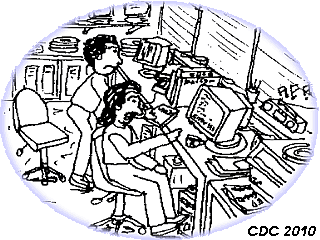
I have touched several subjects on the state of the job market in the USA on this page. In this write-up, I will describe a personal experience with a company I worked for nearly two years, which was highly downsized prior to my "separation" from that company. I cannot mention any names, employees, time schedules, or such for this company for privacy - Just my experiences there due to the effects of the economy and such. I can say that it was from the periods somewhere between 2007 and 2010, with one of the worst economic recessions in the United States occurring within this time-frame.
When I started at this company, working in IT and focusing mainly on their EDI (Electronic Data Interchange) system as well as financials / reporting projects, the company had about 156 full time employees. At my time of separation, the company only had 45. Despite me being laid-off, with my replacement being contractual / temporary work at a lower cost, I was literally doing the duties of 2 (or even 3) IT professionals. I was originally brought aboard to take over a former woman who quit the company, and the IT department once had 5 people working there. When I left, only 2 people remained (the network admin and the IT manager).
Putting overseas outsourcing aside, which in itself is another mayhem for the US economy, downsizing often places tremendous work-loads on existing employees that remain, or any newly hired employees that are replacing a former employee, as in my case. In a small to medium sized company, without a "tight-ship" project management in place, a single IT person may have to take on SEVERAL tasks. For example, my main line of work / job title at this (my) former company was a senior programmer / developer. Due to the fact that there were originally 5 people there (one network admin, 3 senior analysts, and the IT manager), the downsizing to a mere 3 people (including myself) caused a lot of problems.
Basically, in addition to the duties of my "official" job title, I had to deal with hardware (mainly jammed printers, mice, keyboards, and such) as well as training and many other "extra-curricular" activities. The company, at least for the network admin (who would take an ENTIRE day off work over something as silly as his daughter missing a school bus), was rather lax on punctuality. I often had to fill-in for him as well, and at one point, not knowing "his area" of work, I made a problem worse, and actually was spoken to (discipline) for it! Other times, he spent much time over the owner's (CEO) place, installing networking so he can run from his home when he was not in the office.
The job work-flow at this company in IT was very uneven. Often the phones in the IT department would ring at once, so I had to play "helpdesk" as well, sometimes even "juggling" calls. Worst of all, no one in the office would "fill in" for me if I had to leave early or had a day off. Despite detailed explanations on EDI batches that needed to run at certain times, I would often come in the next day (after leaving early the day prior) and find the EDI batch jobs sitting at a "continue" prompt. This happened a few times, and one of which caused 300 EDI documents (called manifests) to go out late.
At $250 a "pop" for late ASN EDI documents, and 300 of them - Do the math - That's what the company had to pay! After several bouts of lack of any help or responsibility for others in my office, I wound up automating many critical EDI batches, as well as other reports to reduce any "mundane" or time-consuming operations. This freed up more time for development and handling any other support projects. I also developed some "fail safe" and "catch" reports to monitor any critical EDI functions, so if anything did go late for some reason, we would catch it and avoid fines. One of these "catches" caught a problem with invoicing for a store in Canada, and saved the company nearly a quarter of a million dollars.
The company had Christmas bonuses, which are rare at any company these days, but during the first year they were cancelled. The following year, they were re-instated. They also had the employee-of-the-month rewards, and who do you think got it that month? Nope, not me - But the person USING my "catch" program. After being at the company for a year or so, I began getting burned out. Despite all my efforts to make the company a better place and probably saving the company from going under altogether, I got neither employee-of-the-month rewards nor any increase salary. The network admin, with his tardiness and missing work, did.
Due to the location, some employees at this company were hard to get a long with as well, making working with them very difficult. Just over a year of seemingly impeccable service, I was called into HR and written up for the stress I was under, as well as "messing up" some settings when the network admin was out the day his daughter missed the school bus. I was placed on "probation" after this for 6-9 months. Vacation and personal time off was given to me, and I actually had a week the first year, starting with my hire date, and another week the next year. However, had I taken a day off, I would come back in the following day and it would take hours to sift through email and / or phone messages.
Often I'd return to cryptic notes on my chair for issues or other "due yesterday" projects that landed on my desk when I was out. Catching up for just a single day taken off would take about THREE DAYS, and this is not including any operations that no one else in IT cared to run / do when I was out of the office. I got to the point where I would take a day here and there, knowing playing catch-up would be too stressful. The stress of doing the jobs of 2-3 "missing" people became unbearable, and I began losing sleep and it started affecting my personal life. Fortunately, a quiet pattern existed for storm chasing when I had this job, otherwise taking time off for that would have caused more problems.
I remember taking a long weekend every month or so (to visit a friend in Chicago), and I would return to the office at about 10 AM on Monday (straight from the airport off a red-eye flight), and work a bit late that night to make up the time. I remember being called into HR and getting "spoken to" about this. I was stunned when they thought I was flying to Chicago to find another job. I guess they merely assumed this because I was stressed so much. I explained to them (in HR) that this was merely visiting a friend I had up there, and it was only once a month.
I was told (by HR) that it was OK with the fact I was NOT looking for work in Chicago (planning to leave them) - However - They also told me I was to be to work at 8 AM on those Mondays. Flying back on Sunday night meant TWICE the airfare. What about the "network guy"? His daughter can miss a bus and he takes off, yet I get back from a periodic personal trip a couple hours late and I am "spoken to"? Not fair. At that point, I was convinced I was being "used" by this company in a sense. Finally, after just under two years of service, the stress and constant "bombardment" of jammed printers and EDI requests / customers with no time to "fit in", I developed a bleeding stomach ulcer (black stool, vomiting, and pain).
Just a day after discovering such a health problem (I am a very healthy man for my age), the HR person came into IT the following day and told me I was terminated. I was NOT fired, but laid off, and given the week and a half of unused vacation time, unemployment, and about three weeks of severance. I was escorted out of the building, going home quite agitated, but in a grateful sense I was out of there. With this new-found "freedom", and having a financial cushion to go on, I took a trip to visit my buddies in California, and spent a week and a half there - Better than a "long weekend", ey?
Later I found out my "replacement" was a temp / contractor hired at a pay rate of HALF of what I was making. This new person left the company (quit) as well due to stress, after only a couple of months. The person I replaced was even contacted to go back to work for them, and she said "no".
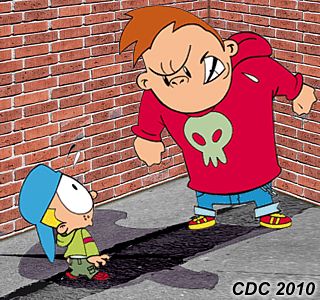
We have all been there at some point in our childhood lives. Walking to the bus stop, going to school, and walking down the halls to our next class ... All while thinking "Are THEY waiting for me?" ... This is the subject of school "bullying". One person (or group) thinks he (or even she) is tougher than "all the others". Often the torment, and in extreme cases, physical violence, is directed towards a seemingly harmless (or apparently defenseless) individual. This problem is a REAL proble, and can sometimes go far beyond a normal "bullying" situation both on or even off the schoolyard.
I am not a parent, but I can attest to the fact that most parents can (and should) be very concerned about the where-abouts of their children. One of the last places this concern may involve is the RELATIVE safety of their children in school. Unfortunately, situations arise when a rival group of kids will single out a person (or persons) because of his or her academic performance, shyness, or differences such as race and / or culture. Most of the time, the jeering (making fun of) and sarcastic attitude is limited to just that (mean jokes) and in the classroom or hallways. Sometimes, however, the behavior can escalate to physical violence (fighting) in places like the playground or bathroom, and can lead to serious injury or death (in a worst-case situation).
I, myself, was a victim of such threats and violence when I was a middle-high school student, that went to the point where my very LIFE was in serious jeopardy. Most of this happened to me between the ages of 11 to 15, and when I was a child living with my parents in Long Island, New York. My main high school was Peconic Junior High (middle school) and Connetquot (High) School (both in Bohemia, New York) during this time (early 1980's). During this time and age, very little was expected from wrong-doing by students, and special education classes often went on beside main-stream (non "SPED") classes, often sharing the same facilities, playground, recesses, and even on the same buses.
My demeneour was radically different at that time. I was very quiet and shy, rather sensitive, and kept my efforts focused more on keeping my grades up (I was on the honor roll frequently) and excelling in math and sciences. Many rival kids became extremely jealous, as when you got on the "honor roll" (merit list), your name was often announced by the school principal. Often, jealous children pick-on (tease / torment) the "smarter" child, and - Like me - If they see it bother him or her, they do it more and more. Sometimes they'd pick a fight ("I call you OUT after school") ... I'd decline because it simply was NOT worth it. This is about as "typical" a bully situation becomes. But, in this case, it did NOT stop there.
This group of "bullying" kids at my school were part of a large group of very disturbed and socially vile individuals. Many were from the special education classes. Most of them drank alcohol and did drugs after school (in the wooded areas as well as parks around the town, especially near Lake Ronkonkoma). This became a very real threat for me as I often would "run into" these people well away from the school yard, especially while on my bike. On at least two separate instances, my bike was completely destroyed, either by the "rivals" (as I call them) crashing into it with their bikes, as well as (and an even more disturbing) incident in June 1985 where one of the "rivals" backed his pickup truck into me!"
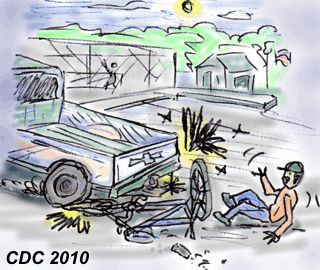
Before impact, I jumped off the bike, and the bike went under the back of the truck. I was OK, and shaken, and the person sped off. He waited for be to be BEHIND the truck, then threw it into reverse gear - So I know for a fact it was NO "accident". I also knew the "person" in the truck as the same person who always made fun of me during class, calling me "psycho". This was right before I moved to Florida in mid 1985, so I was happy to leave behind such a dangerous crowd. This scares me to this day, and I am sure and parent reading this may have nighmares from it. There is a BIG DIFFERENCE from a person calling someone names, and a person who tries to KILL someone he (or she) does not like. I consider the person who tried to back his truck over me as if he wanted me dead (or really hurt) - No more, no less.
At least three or four other incidents occurred because of the aforementioned "rival" group in my high school. Violence from them began in early 1982, and continued on occasion until mid 1985 (when I moved out). In early 1982, I was dragged onto thin ice (on Lake Ronkonkoma) by a group from the "rival" gang, with intent to throw me into a hole in the ice. I fought my way away from them and ran home. Two other times (in 1983 and 1984), I was pushed into the water (at the same lake), and in 1983, one of the individuals had a small knife when he was grabbing me (my friend, Nick, who was with me at the time, saw the knife, I didn't). The scary thing is that these people were all part of the SAME group of "rivals", from my school, and it all started with someone from "SPED" being jealous of my 'good grades'.
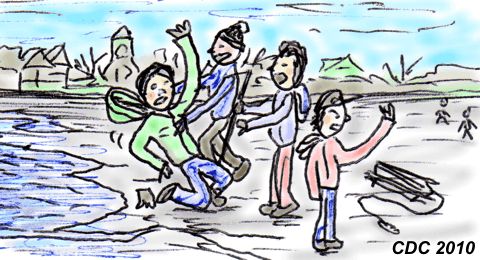
So what is a person in his tween-age years to do? Tell his parents, ofcourse. We look to our parents as "Gods" at that point in our lives. My parents were not happy when I told them these things. As you can imagine, fear was their big thing, as any parent would. Fear is bad, and causes anger and dis-belief. Becoming protective, my parents would not ALLOW me off the block, unless I was with a friend, like my best friend Nick at the time. They also cancelled a school trip, which I was devastated after looking forward too for many months, but it was only meant well as part of that dangerous "rival" gang was indeed going on that trip. As a child, I never understood my parents seemingly "punishing" intentions at the time, but it was all for protection, as any scared parent would embrace.
My parents, in their scared mode, and going through problems themselves at the time, told me to "fight back" ... Even one more extreme command was from my father, telling me "I will let you go on the trip if I get a call from the pricipal, and hear you punched him (the "rival") in the face." ... Ofcourse, I didn't. It would have been me and him (the "rival"), but what if he got 10 from his "gang"? Maybe had I listened to my dad, I would not be here right now. Instead, I made a friend with one of the "rivals". Not a good friend, but someone in THEIR group who I had at least something in common with him to "break the ice". The torment and violence "magically" went away after leveling with just this one person, and just about that same time, I moved out of NY (to FL).
Instead of giving into my parents' tactics of fighting, which may have only SEEMED realistic in their point of view at the time, I foregone that route and chose a NON VIOLENT way of dealing with this seemingly un-solveable problem. Second, I learned the harsh and rather sad details on the "foundation" of the "rival" groups' actions from this new "friend" of mine. Most, if not all of the teenagers, including the one who tried to run me over, were abused and / or grew up in households dominated by domestic violence, parents divorcing, and such. Now the question is how MANY people are unlucky-enough to NOT have caring parents like mine? Instead of being angry, I got sad, and actually felt bad for those bad kids in a sense. This leads me into a few ways to prevent such things, if it's not already too late.
The period from about 10 to 12 years old is the "sponge" period, where a child soaks up just about everything, especially examples, including puberty, relationships, and such. The parents, as mentioned earlier, are like "Gods" to them, and nearly ALL examples will be learned from them. Having caring and protective parents (now the key thing here is reasonably and not overly protective) is paramount during these sensitive years of a child's life. Never - ever - Get angry at them because they failed at something like a test or class. Instead, encourage them to 'try harder next time'. Domestic violence and abuse is only one thing for a child - BAD! Even if it's NOT directed at the child, simply growing up in a turbulent setting (parents always arguing) sets an awful example for a developing mind.
If you are having problems in your marriage - Get help, period. If you are directing anger (any kind) at your child - Stop, period. If your child is in a "bully", or - like mine - a threatening situation, talk to them about it, and never encourage a violent (fighting back) behavior. As with my parents, not letting me go on the trip was a smart choice, but telling me to "punch the kid back" may not have been. The last resort is changing schools and / or moving out of the area. Making a friend (like I did) with one of the "gang" may or may not be good, because many times, this person is not someone you want as a (main) friend. He or she could be a bad influence (introducing you to cutting clases, drug use, etc., and such). I knew my limits, and never gave into these things. Make sure your child doesn't either.
In conclusion, I hope some can benefit and understand how a bully (or threatening) situation can be handled, and how to identify it, by sharing my personal experiences with it when I was young, and still lucky enough to talk about it. Unfortunately, many of the people from the "rival" group are either in prison or still living with their parents, because they never got ahead in life ... I visited my old neighborhood in New York back in the late 1990's, and I saw what happened to these people (taking the wrong path in life) with my own eyes.

According to legend, there is a curse that Madame Pele, the Goddess of Fire, placed upon the Hawaiian Islands. This "curse" includes bad luck inflicted on anyone removing volcanic rocks and / or artifacts from any of these Pacific islands. Sound crazy? This is not a joke ... And whether it's real, or a "self-fulfilling prophecy", the end result is very bad. I think you should read my personal experience with Madame Pele and decide for yourself.
Back in February 1994, during my college winter break, I traveled to Oahu (Honolulu), Hawaii for a week's trip, staying in a spare room a friend of mine (who moved there from Maine and worked as an air traffic controller). The opportunity was irresistible, and who can turn down a stay in "paradise", including surfing on some of the biggest waves in the World?
I arrived there and my friend, Scott, showed me around the island on the first day, and we "partied" a bit with his college buddies and local Asian / Filipino friends the first few days. I went flying and did some aerobatics (the Pitts Special footage is even on this web site, in the FLYING section), enjoyed the beaches, surfed, and wrapped up my final days there with an island hopping flight to Kona on the "Big Island" of Hilo for a tour around and on the volcanoes, including Kilauea.
I was told by the bus-tour guide about the warning about taking ANYTHING natural from the islands, especially rocks. Still having the time of my life, I decided to take home some souvenirs. One was a wooden carved ash tray saying "Mahalo" for my parents. Another was a few bags of Macadamia nuts. And, unfortunately, a plastic container of obsidian (black volcanic glass) from the black-sand (Kaimu) beach, and two lava rocks from the moonlike landscape near the Kilauea crater. I was 23 at the time, having a ball ... The last thing a young college man ever worries about is a "curse" - Right?
Bad luck started almost immediately when wrapping up the tour and flying back into Oahu (Honolulu). The flight was delayed, and ran into stiff turbulence. Scott, my friend in Hawaii, just had his apartment burglarized by someone he knew on bad terms, and could not pick me up (he was using the car rental that day). Money, for half the rental car, was stolen (by Scott's "ex friend") that was in a jar. It was only $100, and I told him don't worry about it anyway. I took the cab ride back to Scott's place and was relieved to find nothing of mine was taken.
The next morning - Early - Was my time to fly back home to the US Mainland (Florida). I wake up, and - to my horror - The rental car was NOT there! When I moved it the night before, I parked it in a travel lane (you can only park there at night, and it was towed). This caused me to miss my flight. By late morning I got my car back after coughing up $200 for the tow, plus a $70 parking fine, and $100 to re-book the missed morning flight for the late afternoon. I left the island with a fortunate feeling that this happened on the LAST day of a week-long trip, and, of course, NEVER suspecting the rocks / black-sand in my baggage was causing this!
Upon returning to Florida, I noticed changes and bad luck occurring with an inordinate frequency. Just days after my return, my car blew a heater core, sending 250+ degree F toxic steam and coolant through my A/C vents, burning my arms and forcing my car to overheat. Again, I had to be towed. The repair for the heater core was very expensive, so I just paid for the tow and bypassed the core myself. Less than a month later, the same car, the engine (which had a head gasket replaced 6 months prior) blew up (nearly $2,000).
At about the same time, in mid to late spring of 1994, I started running across an old ex-friend, who I avoided since the early 90's and have not seen since, almost on a weekly basis, and had much friction with him. All this time, my father and I started having frequent arguments as him and I could not get along very well at the time and I had to leave (I was still living with them). In the early summer of 1994 my mother was "T-Boned" by a person who ran a red light and nearly killed, spending a day in the hospital. The very next day, I was fired from my job an accused of "marketing computers through their firm" ... The computer was a defective computer I bought as-is (Commodore Amiga 1200) that I was trying to sell via a newspaper ad with my home and office number. I was fired because of the office number and out of work for 6 months and, even worse, the company gave me a bad reference to other (potential) clients.
From that point on, my IT career suffered badly, with long gaps in unemployment (mainly due to layoffs, mergers, and other things, none of which were my fault) and financial problems here and there - Well into the 21st century. In early 1995, my grandmother from my mom's side suddenly passed away. In 1995 I gave the two rocks from the Kilauea volcano to a younger friend of mine, Clay, who lived around the corner from my parents. Clay was a successful A student in junior high school and his main subject was Earth science. I still kept the black sand on my shelf, in the same plastic container. The bad luck eased up almost immediately, except for some annoying money / job problems that continued, but I assumed that was just life, and did not think the black sand was bad luck (just the rocks from the volcanoes).
Around that time, I was a show on the Travel Channel that highlighted stories about people who took rocks from Hawaii's volcanoes. One dwelled on the drama that began with an argument a couple had on the plane ride home to California, eventually leading to domestic violence and a bitter divorce. Another was a couple who took rocks and later their home was broken into, with both shot by the thief. The husband died and the wife was paralyzed permanently from the waist down. The creepy list of such problems and death went on and on.
Later in 1999, I visited my parents and decided to see how my neighborhood was doing. I saw Clay's mother, 200 pounds heavier, and had a brief conversation with her. She was so sad and devastated, and her son (Clay) was in prison as he was framed for a shooting one of his friends did in 1996! Clay, tried as an adult, was sentenced to be in prison for over 20 years (until 2016, but got out earlier / paroll)! Now I was panicked, and really scared. I immediately thought about the lava rocks I gave Clay, and was finally convinced that something was going on too much to be just a coincidence. I searched all over his place, and even asked his mom, but could not find them. I felt so miserable seeing his mom overweight and such a potential young person's life thrown out the window. God please forgive me for this.
It was not until late 2004 / early 2005 when I realized the black sand was causing problems as well. I was in and out of jobs, so much that at an interview my "gaps between jobs" and "short times spent at each" company spoiled the interviews. My best friend, Jose, who I knew for 10 years at the time, and was living at my place, developed complications from diabetes. In 2000 he suffered from a stroke AND a massive heart attack a few months after (requiring 5 bypass surgery and was followed by disability). From 2004, he struggled with kidney failure, paralysis, and spent 16 months in the hospital during most of 2005. He also began using me as an outlet for his frustrations, making me miserable at times, to the point even my health was affected.
Jose eventually died in mid 2007 at only 43 after 3 years of agony (see my section on DIABETES for the full story on that). His mother, also taking care of him, even blamed me for most of his problems, some of which later jeopardized the sale of my home up until 2008. My other grandmother passed away, also suddenly during the same year of 2005, right after hurricane Wilma caused throusands of dollars in damage to my home.
In March of 2005, right after spending $3000 to replace an A/C unit on my home that was only 5 years old, I packaged the black sand in USPS Priority Mail and mailed the sand (pictured above) back to Hawaii (address provided at www.volcanogallery.com).
Outside of my friends deteriorating health (if that was because of the sand, the damage was already done), luck improved rapidly with my life, including job stuff and even relationships (which I was in and out of, often with a broken heart, leaving me single most of the time up to age 36). I consider myself one of the lucky ones (if you read many of the stories on the "volcano gallery" site, you'll cringe).
Still don't believe in the "curse" ... Or is this all just a coincidence? Or, a self-fulfilled prophecy (trying to avoid something out of fear / doubt may actually cause what you are trying to avoid to happen). You decide. But if you are in Hawaii, don't take anything (especially if you hate bad changes in life where you LOSE things you really like, such as your health or loved ones) ... You might be sorry, curse or no curse!
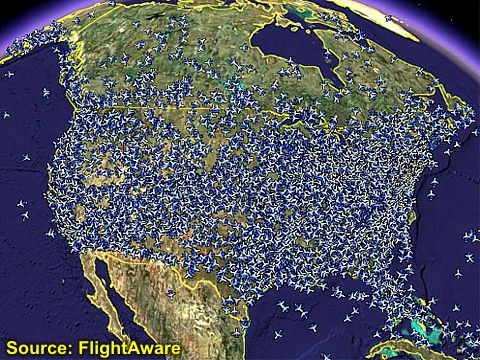
Recently, flying has become more and more of a dreaded and fearful experience for many Americans and world travelers alike. The fear is stemming from the fear of being involved in an aicraft accident and / or terrorist incident. In this section, I'll throw in some facts and statistics that will make you think overwise, or even wish you were on a plane inteat (compared to doing other things)! The diagram above shows the average amount of commercial airliners airborne at any given moment over North America (about 5,000 aircraft)!
One must also consider that this image (above) is AT A GIVEN TIME and NOT for a whole day or week ... In a days time, the number of flights over the USA alone averages 87,000, 30,000 of which are commercial airliners and the remaining 2/3 are mostly private and some military aviation. Focusing on the commerical airliners alone, that's over 10 MILLION flights per year! Around the world, considering Asia and Europe, that figure is two to three times. When (and IF) a commerical plane is involved in a fatal crash or accident it receives media attention - Maybe TOO MUCH.
With the media exploiting "how bad it can be" and focusing on the grim and negativity of an accident, anyone can develop an inordinate sense of insecurity, possibly to the point they may cancel a trip, or in extreme cases, not fly anymore. This effect became apparent after the 9-11-2001 attacks (also detailed on this web-page), where people put "off fly" had devastating effects on the US economy, especially with airline revenues. Both terrorist threat prevention, security, and airline safety are the most stringent and strongest as they ever were since 2001.
OK, still afraid to step on a plane, putting "someone else" in control (the pilot), and still don't wanna take that trip to Hong Kong? Well, consider this. According to Boeing, the number of people killed in an airline disaster SINCE AVIATION BEGAN was about 21,000 people WORLDWIDE. Seem like alot ... But facts show that the same "21,000 people" die in a car accident on US HIGHWAYS in a SIX MONTH period, that's nearly 42,000 people per year, just in the United States! You are literally 22 times more likely to be killed DRIVING TO the airport, than the flight itself!
Statistically, the chances of a person being killed in an aircraft accident is about one in 11 MILLION. This is roughly the same chances of winning millions with the lottery, and you'll have to fly one round-trip (2 flights) PER DAY for 15,000 years to meet such odds! The chances of being killed in a traffic accident are a mere one in 5,000. The changes of dying in a skydiving accident are about one in 8,000 - Statistically, skydiving is SAFER than driving to work! This mere PERCEPTION of danger is known as a NEGATIVE BIAS, and is encouraged by the media and / or stereotyping.
Looking at more common accidental deaths is even more shocking. About 600 people are killed each year in the US falling out of their bed waking up ... And combine this with slip and falls, choking, and household accidents, the deaths from flying incidents are surpassed by a long-shot. Even more interesting, with the post 9-11-2001 fears of flying, less people flew and more people drove instead, making that year one of the highest for highway fatalities in the US in quite some time (a self-fulfilled prophecy).
The reliability of commercial airliners and professionalism of those who fly them make this by far the safest mode of travel for anyone. Accidents do happen, and if an airliner is involved in one, a fatal crash is not the outcome 100% of the time ... Look at the US Airways landing in the Hudson River in 2009 after a bird strike - Professionalism saved the day and everyone survived. Just look at the diagram above, all those planes, all the time, day in and day out ... Very rare / next to impossible anything will go wrong!
| Safest 25 | Most Dangerous 25 | ||
|---|---|---|---|
| 1 | Ramapo, NY | 1 | New Orleans, LA |
| 2 | Mission Viejo, CA | 2 | Camden, NJ |
| 3 | O'Fallon, MO | 3 | Detroit, MI |
| 4 | Newton, MA | 4 | St. Louis, MO |
| 5 | Brick Township, NJ | 5 | Oakland, CA |
| 6 | Clarkstown, NY | 6 | Flint, MI |
| 7 | Amherst, NY | 7 | Gary, IN |
| 8 | Greece, NY | 8 | Birmingham, AL |
| 9 | Allen, TX | 9 | Richmond, CA |
| 10 | Colonie, NY | 10 | North Charleston, SC |
| 11 | Irvine, CA | 11 | Cleveland, OH |
| 12 | Lake Forest, CA | 12 | Baltimore, MD |
| 13 | Chino Hills, CA | 13 | Miami Gardens, FL |
| 14 | Toms River Township, NJ | 14 | Memphis, TN |
| 15 | Cary, NC | 15 | Youngstown, OH |
| 16 | Frisco, TX | 16 | Atlanta, GA |
| 17 | Sugar Land, TX | 17 | Compton, CA |
| 18 | Thousand Oaks, CA | 18 | Orlando, FL |
| 19 | Round Rock, TX | 19 | Little Rock, AR |
| 20 | Orem, UT | 20 | Minneapolis, MN |
| 21 | Troy, MI | 21 | Washington, DC |
| 22 | Missouri City, TX | 22 | Philadelphia, PA |
| 23 | Gilbert, AZ | 23 | Jackson, MS |
| 24 | Edison Township, NJ | 24 | Newark, NJ |
| 25 | Cranston, RI | 25 | Milwaukee, WI |
SOURCE: Morgan Quitno / Wikipedia 2006-2008
We all (or most of us) are concerned about our safety ... But one wonders how safe we are. This depends on where we live (such as with crime rates, shown above in the table of "least" and "most dangerous" places to live in the United States), but there is more to "safety" than just where you live and how you live. Many assumptions and stereotypes have been going around based on lifestyles and habits as well.
One important aspect is the "rask taking" community. I am not talking about criminals and foolish behavior (such as drunk driving), those risks are pretty obvious, but the seemingly "unlikely" risks associated with thrill seekers and adventurers as well. Many such people are injured or killed not by their "obvious" activities, but simple and un-wary tings of everyday life that have gone horribly wrong.
Take myself for a first example. I am an adventurer and thrill-seeker. I skydive frequently, chase storms (tornadoes, hurricanes, etc), and live a rather adventurous lifestyle. As of today (January 2009), I never had any injury or problems with these (seemingly) dangerous sports or activities. In fact, the only time I ever "broke a bone" was in 1997 was a snapped finger / torn tendon and ligament in my right hand from pulling a sheet when making my bed - Yes, you heard right - MAKING MY BED!
The aformentioned (and seemingly rediculous) injury, from making my bed, required hand surgery, 6-8 months of recovery (with a slint), and loss of use in much of my hand for nearly a year. Yet, I received numerous assumptions that the injury was from a "skydiving accident" and laughed / scoffed at upon correcting them and telling them HOW it actually happened.
Years later, in December 2006, I came close to being killed in a rollover accident, where a flat-bed tow truck (at fault) ran me off the highway at high speed. I managed to escape with only minor injuries and a laceration on my face. No this was not some long road trip or storm-chasing trip, but 5 minutes from my house returning from the post office after dropping off some greeting cards in the mail.
In more contrasting and extreme cases, world-renowned zoologist, Steve Irwin - A daring man nicknamed "The Crocodile Hunter" and noted for handling some of the dangerous creatures known to man (alligators, venomous snakes, etc), never got killed doing what he did best. Then in September 2006, during a leisurly weekend swim with family, gets stuck with a sting-ray's tail (in the chest, of all places) and quicky dies.
Another example is Steve Fossett, a world-class aviator and adventurer. He sailed around the world. He flew non-stop around the world, setting a record. He attempted to pilot a balloon around the world. This wealthy man took many chances, had many close calls, and was placed in survival situations many times that he pulled out of. In September 2007, on a short trip aboard his light aircraft, he perishes in the Nevada wilderness. His body was not found for over a year. A trip "around the world" did not kill him, but a trip "around the corner" did.
In July 2005, fellow storm chaser Jeff Wear intercepted hurricane Dennis. He was killed not from the chase, but driving back home to Texas, thanks to a careless driver. Basically, it is safe to say that the risks I take driving to work every morning are more "dangerous" than my skydiving and storm chasing hobbies combined! It's sometimes not the obvious things that hurt and kill, but the smaller things that may be overlooked / out of your control.
There is also another scary effect that is known as a SELF FULFILLED PROPHECY. This is where trying to prevent something dreadful either hastens or causes it to occur. This is usually the "mechanism" behind curses and religeous beliefs. This is like someone telling you "take aspirin daily" because your'e a high risk for a heart attack, and then dying from an allergic reaction to the aspirin.
In conclusion, people may SEEM be at risk from very OBVIOUS things, but the real danger may come from some of the most overlooked and insignificant LITTLE things in life. Not to scare you ... But you have been warned.

Air Force One, a military / government conversion of a Boeing 747-200B aircraft (designated as a VC-27A), makes it's final approach into Miami International Airport during the early afternoon of Friday, Ocrober 10, 2008. This plane is a highly customized "Oval Office in the sky" and allows the president, G W Bush (onboard at the time) to be capeable of running the country from this plane in the event the US is under attack or any other circumstances making Washington DC not an option. The plane has a range of just under 8,000 miles, can fly at speeds up to 630-MPH, and has a service ceiling of about 45,000 feet. The plane is seen here, in the landing configuration, with the distinct white and light blue livery and US government emblems. Pictures were taken from a nearby office building by the staff of Rally manufacturing and myself.

This is a small notion about the racial and ethnical makeup of some cities in the United States and other countries. We all call the United States a "melting pot", as there is just about every race, language, religeon, and culture from all over the World. Sometimes, different races in a city live in harmony alongside one another. Other times, we hardly take notice. Many times, there is inter-racial dating and friendship, where cultures are cherished and shared. Other, and more darker times, some cities remain "segregated", with a black and white "area", totally separate and removed, very much the same way as in the 1950's.
I developed the annotated diagram above to illustrate, by "colors" on the racial and demographic "acceptance" of some cities I either lived in and / or visited. Three examples are shown. To the left is Dayton, Ohio. Dayton is a "segregated" city, and has a very large black population living on it's west side. Ofcourse, being in the Midwestern USA, it also has a large white population. Unfortunately, the "white flight" and demise of businesses near the inner-city regions of Dayton caused both major groups of people to stick to nearly "restricted areas". There is very little contact or "mingling" between the "black and white" communities. As the left image in the diagram denotes, a solid "black and white" image is depicted. Other minorities, such as Hispanics (Latinos) and especially Asians, are in very limited numbers, and also in small scattered communities.
The middle diagram shows a much higher cosmopolitan city - Miami, Florida. Although one of the largest "melting pots" in the World, there is still a "segregation" between the black, white, and most importantly, the Hispanic communities. Again, Asians are a small group scattered throughout the community (but much more than in Dayton, Ohio). Also note that there IS a bit of contact and "mingling" betwen the major races (where the colors "blend"). Still, the areas remain quite segregated. Examples of the black community in Miami are Overtown and Liberty City. The Hispanic community, predominantly Cuban, is near Little Havana and Sweetwater. The whites are scattered, but focused mainly in southern Miami (Homestead) and near Miami Beach.
Finally, to the right is Toronto in the province of Ontario in Canada. Note that there are virtually NO "areas" or segregation what so ever. This is because Toronto is the most ethnically diverse city in the World. Hispanics, Blacks, Middle-Easterners, Whites, Europeans, Indians, Asians, etc all live alongside one another and in near perfect acceptance. There is a vast mix of cultures, food, and religion in Toronto. This is a long and far cry from Dayton, Ohio, which is a mere 400 miles to the SW of Toronto! Ofcourse, the diagram to the right depicts a "city of color" as a visitor to Toronto will see more races and hear more languages spoken in 10 minutes watching a crowd pass by than a person in Dayton, Ohio would hear in an entire lifetime!
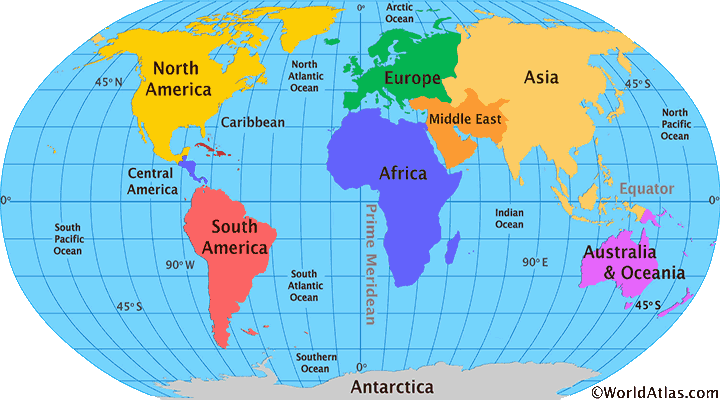
The map of the world above shows the geographical regions of Earth. If you move your mouse over the map, and you can click on that area, that will take you to a link (below) showing an example of the ethic / race of that region.
CAUCASIAN / UNITED STATES - EUROPEAN DESCENT
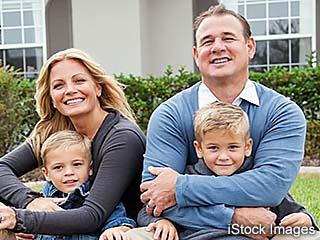
|
American / Caucasian. This includes people of European descent, born in the United States Of America or Canada, or those who have traveled to this area. The influences of culture, agriculture, and society - Ranging from Germany to France have left a permenent mark on north America. |
AFRICAN / NEGRO - AFRICAN DESCENT

|
Black / Negro backround. This is a major racial make-up of sub-Saharan Africa and widely distribited worldwide. African culture is strong and rich throught the world, and even had profound influences throuought the Caribbean and southern USA. Jazz music and food brought by this culture is invaluable at historic levels. |
AMERINDIAN / NATIVE AMERICAN - INCLUDES LATINO / MESTIZO INFLUENCE

|
Native American / American Indian background. This region is also a host to many mixtures of races, including Mestizo (mix of American Indian and Caucasion). These areas feature am interesting mix of culture and heritage, unlike anywhere else on earth. |
MIDDLE EASTERN / PALESTINIAN

|
Middle Eastern. This includes the areas stretching from far eastern Europe (near Israel) to Saudia Arabia and the Middle East to just west of India. This rather troubles area, fighting on-going conflicts, still features a strong religeon and cultural history. |
INDONESIA / SOUTHEAST ASIA

|
South and southeast Asians. This area has a wide and diverse, and even indiginous culture that has existed for many millenia. It has a strong influence and discipline from Islam that stretches to Buddhism as one procedes eastward. |
EAST ASIAN / HAN CULTURE

|
Eastern Asian. This is by far the largest ethic group in the world (Han people), comprising the area from the northern parts of SE Asia towards areas as far as Korea and Eastern Russia, including islands like Taiwan and the Phillipines archapelico. To no surprise, this beautiful collection of people gives rise to all types of religeons, especially Buddhism, a highly developed social and technical culture, not to mention just about any type of food imaginable. |
ESKIMO / NATIVE AMERICAN
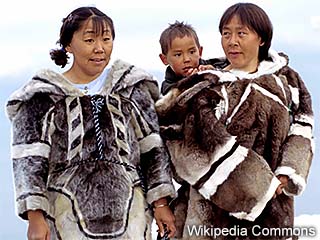
|
Eskimo / Alaskan (or Native American). This race stretches across the northern parts of North America, especially Alaska and far northern Canada, and into Greenland. Their culture is unique to survival skills, hunting and gathering, and have a strong belief in conservation and spiritual life combined with nature. Their original origins, given the highly Asian appearance, are not fully understood - But theories hold that they migrated to North America from the Asian super-continent during the late ice-age period. |
RUSSIA / EURASIAN PEOPLE

|
Russian people. This area has a long history and notable past of the U.S.S.R as well as remote regions in the cold and massive super-continent of northern Asia. |
EUROPEAN / CAUCASIAN RACE

|
European people. This area is a vast collection of cultures and caucasian races spanning from Spain to eastern Europe, such as Turkey, with a rich history. Europeans have dominated the world in many regions - Especially the USA (white people) and Canada. Most of Europe is dominated by an advanced society and wealthy culture. Skin color ranges from fair in the north (such as with Norwegians, pictured here), to olive / darker in the south (as with Italians) near the Meditarranean Sea. |
SOUTH AMERICAN PEOPLE

|
South American people. South America is a powerful community influenced by both Spain and / or the American Indian sub-culture. The racial makeup of this area ranges from European Spanish (such as in Argentina), to Asian (Japanese immigrants) / Amerindian (as in Peru / Brazil). The mix of society and culture in South America is also strongly influenced by the Catholic religeon, as well as many other indigenous beliefs. |
SOUTH AFRICAN PEOPLE

|
South African people. Despite being in the African Continent, this area has a strong British influence, yet with the mingling of the African / black culture (after a period of apartheid / conflict years back), with white / European. Cape Town is located it the southern tip of this nation, and this region has since become a welcoming and eclectic British community. |
AUSTRALIA / ABORIGINE PEOPLE

|
Australian people. Australia has a messive European / British inflience. However, the Aborigine people are a powerful indigenous culture that dominated the contintent long before the British / Europeans arrived. |
POLYNESIAN / PACIFIC ISLANDER PEOPLE

|
Pacific Islanders. These people are the inhabitants of Oceania and Polynesia, and are similar to Hawaiians. They are highly tied to ancesteral and / or cultural / religeous beliefs. Their influence on a cultural level has been unsurpassed in the western world, second to the Asian community. |
ARTIC / ANTARCTIC PEOPLE
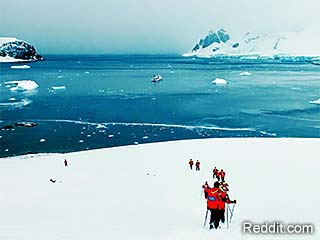
|
Artic regions. No one actively lives in these areas due to the inhospitable environment, plagued by deadly cold temperatures and severe winter-like storms. Only explorers and travelers who dare to venture to these areas can experience the hostile arctic environment. |
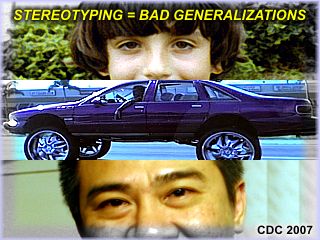
We all are guilty of "stereotyping" at one point in our lives sooner or later. But what exactly does this mean? Is it racism? Is it a bad joke? Or is it just describing an attribute of a particular race, lifestyle, or religeon? The answer varies greatly, but put straight forward, STEREOTYPING is the LABELING of a behavior or characteristic to a race, lifestyle, or religeon WITHOUT sufficient proof or evidence to justify it. As you can imagine, such labeling can be brushed or laughed off by some, but taken very personally and hurtfully by others.
First of all, there are attributes and characteristics that are NOT stereotypes for a certain race, lifestyle, or religeon. This is like the statement "MOST black men may have dark and curly hair" ... This is MOSTLY true since it is a simple fact based on appearance and genetics. However, another statement related to a lifestyle, such as "He is gay, therefore he must work as a flight attendant or hair stylist", is a stereotype. Statistically many flight attendands MIGHT be gay, but NOT all gay people work as such. As you can see, an attribute or characteristic can reflect a stereotype if worded the wrong way!
I remember hearing a rather disturbing statement based on an event that occurred and was being reported on the local news. This individual saw a story about a robbery that HAPPENED to take place in an African American section of the neighborhood. This person was "Ofcourse, Blacks - Always stealign stuff!" ... I stopped him and explained to him that ONLY that area happened to have a crime and they HAPPENED to be Black. Out of many Black people, how many of them steal? You are only seeing a small piece of the picture, and from that poor example, as well as limited information, someone can easily draw a conclusion about "all" Black people being "bad". This is called "generalization", and is a very brutal form of stereotyping.
There are also many other forms of stereotyping. For example, Asians are assumed to be "bad drivers" and might be avoided as such. This is INDEED a STEREOTYPE. Such a stereotype originated from the fact that Asians may have a narrower field of vision since their eye lids are thicker. This, ofcourse, is a PHYSICAL characteristic, and should NEVER be stereotyped on as such vision should not affect one's driving since he or she may be used to it all their life. A very bad religeous stereotype might be a statement like "Jewish people are cheap". This is again, a WRONG assumption based on generalizing examples. The area where such a stereotype about Jewish people is popular is in southern Florida, where a community of elderly retirees exists. Jewish or not, these individuals are living on a LIMITED fixed income, and financially cautious - Especially with the state of the US economy! Assuming a "penny wise" elderly person is a "cheap Jew" is down right WRONG. He or she might just be worried about their welfare, a common ATTRIBUTE among such people, and has NOTHING to do with their religeon.
Stereotypes are everywhere. Some barely discernable between characteristics and others blatent and down-right offensive. We can reduce or even eliminate unfair stereotyping ... And it may be as simple as stepping back and viewing the whole "picture" rather than just fixating on a "small piece" of it!
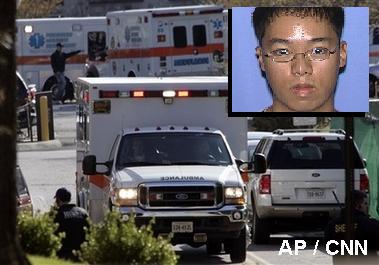
Our heart and sorrow goes out to all the victims, friends, and families, plus anyone who has been affected by the senseless and tragic shooting spree that took place at Virginia Tech the day on Monday, April 16 of 2007. This is another horrific example of what kinds of roads people may be headed down in our world today! This is indeed the dark-side of what we all see in the NEWS.
What drives people to do such un-imaginable things is beyond belief and understanding for even the most prudent investigators and psychologists. Is it their up-bringing? Some tragic event in their live like abuse? Do they enjoy doing it? Or all of the above? Or maybe even none of the above?
Killing sprees like this are not all that uncommon. Less than 7 years prior, April 20, 1999 to be exact, 13 people including a teacher were brutally shot to death before the murderer turned the gun on himself. Most recently at the time of this writing, 33 deaths is nearly 2-3 times the death toll as the Columbine shootings. These are also not to be focused on since two other such shootings, one being in 1927 (Bath School) and the other 1966 University of Texas Massacre. Such portrayals of such human violence is beyond any understanding in anyone in a right state-of-mind.
This also raises many other problems and social issues. Besides the media and news outlets trying to exaggerate and make the story more appealing to enthusiast, questions arise on the security infrastructure of the school the massacre happened. Other sensitive issues are racial stereotyping (in the Virginia Tech shooting, the murderer was Korean, so many are wrongfully stereotyping and / or questioning the sanity of some Asian immigrants). Had the same crime been committed by a person(s) of certain Middle Eastern descent, some officials may even suspect terrorism.
Quite blatantly, the injured survivors of such an incident will most likely face un-imaginable physical, emotional, and / or mental challenges. Witnesses, friends, and families may also have a different, and sometimes unrealistically apprehensive fears (such as being "afraid to go outside") fears. Some more immediate warnings can be as simply as the way the (potential) assassin may act. In the 2007 shootings, the shooter was a very socially withdrawn person. Such an attitude change was marked by rudeness and solitary (anti-social) behavior (such as "few friends"). In other cases, the person may be "quiet and calm" until he or she "loses it", surprising victims and witnesses alike.
While fore-going stereotypes, considerations about background, race, and intelligence, care must be taken to see the signs that someone is headed down a path that will danger themselves or others. In the 2007 shooting, there WERE signs, but many were ignored. Many times a mental problem is often ignored, and even scoffed at. Many health insurance companies have highly limited benefits for people requiring mental health (such as high co-payments, or no coverage at all)! Society in general also "labels" a disturbed / depressed person as "crazy" or "nut-job". This makes the mental problems MUCH worse. This is like seeing a person having a heart attack, and telling him "You were supposed to quit smoking, deal with it!" - That would be very inappropriate - So why is a person who is depressed treated in a SIMILAR way?
Other people have much less obvious behavior. For example, Jeffrey Dahmer, a serial killer from Wisconsin during the late 1980's to early 1990's was never caught in the act, until a law enforcement official "accidentally" stumbled into a section in his apartment where nearly a dozen men were killed in bizarre ways. No one at Dahmer's work, or even family, knew what was going on during his killing sprees. His parents at one point, sensed a problem, but they IGNORED it.
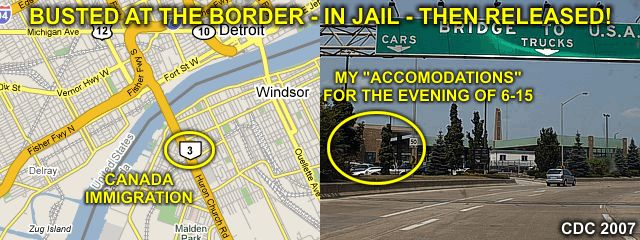
This writing is about an ACTUAL experience I had when entering Canada via the Ambassador Bridge from Detroit, Michigan (USA) into Windsor, Ontario (Canada) on Friday, June 15, 2007 at roughly 6:30 PM to start a weekend road-trip from Dayton, Ohio into the Toronto (and Niagara Falls) area of Canada with a return to the USA the same route on Sunday, June 17, 2007. This bizarre incident occurred when my vehicle (and all its contents) was searched at the Canadian Immigration / Customs facility after my vehicle was "flagged" for inspection. In the image above is the place where this happened. The map on the left shows the location of Windsor, Ontario and Detroit, Michigan across the river in the USA with the Ambassador Bridge connecting the two. The right picture is the canadian Immigration building where I was held. In fact, my "cell" was to the extreme lower-left of the building in that picture!
Due to "suspicious contents" found on my laptop computer, brought along for both GPS mapping and internet (email), I was detained and subsequently arrested. I spent about 6 hours at the facility, most of that time in a holding cell (aka: "Jail"), until a special investigator scrutinized my laptop and all contents and deemed there was "nothing there" that was illegal. After this terrifying and seemingly un-fair wait, I was released and apologized to and continued on to my destination, with no more than frustration and a 6-hour delay. Below is the actual DETAILS of how this all unfolded.
First of all, I will go into the contents of my laptop computer, since this item was the main focus of this ordeal. I have Windows XP home edition with SP 2 installed on a HD space of 80 GB. The laptop is a 2.3 GHz Pentium IV with WiFI capability and USB 2.0. My HDD has MS Office 2000 (with Outlook), Delorme Street Atlas USA 2005, graphics (Corel) and sound (Adobe Audition) software, Adobe Premiere 6.5, and a few others (such as MS Visual Basic 6.0). The data on the disk is stored in "My Documents" and consists of a pictures section, video, and a backup of my entire web site. In the video section, much footage from storm chasing is there, plus other footage from theme parks (roller coasters), and some skydiving and aviation videos (flying, glider, commercial flights, etc). The sound section has many MP3 music files, also backed up on my iPod.
Finally, my pictures section contains many pictures of storms, family, and - most importantly - some downloaded images from the internet such as Asian lingerie / underwear pictures. I have NO PORNOGRAPHY on my laptop, as I use it mainly for navigation, internet, email, and video / picture editing when I am traveling or storm chasing. There was one directory there called "Beautiful_Asians" in the "My Pictures" directory in the "My Documents" folder. Ironically, although some of the pictures appear young, none of the individuals there are under 18, and anything "below the waist" was cropped, plus no shots of bare fronts (only bare backs) were displayed. I do not have video or anything "hard-core" pornographic on my laptop as I am not a huge fan of porn over the Internet.
I decided to take a weekend road trip to Toronto. This is leaving Dayton, Ohio by heading up I-75, got to Detroit, Michigan then across the Ambassador Bridge into Windsor, Canada for customs check, then to Toronto via Canada highway 401. The trip takes roughly 5 hours, and since I was working in Dayton, Ohio at the time, I decided to take the road trip while I have the opportunity.
I brought my laptop since it has GPS on it and shows the US / Canadian roads to take in case I get lost (once I am in Canada). I did not need it at the time of crossing the border, so my laptop was packed away in it's bag and sitting on the floor in front of the passenger front seat of my car. I had another bag for 2-3 days worth of shorts, t-shirt, jacket, long pants, socks, underwear, and toiletries. This is the same stuff I usually travel to Florida with, as I always pack light. Since I left directly from my job, I also had my briefcase. My MP3 player, among a couple of other things (passport, check book) was in the briefcase along with the notepad I use at my job.
As expected, roughly 6:30 PM, I paid the toll and crossed the bridge from downtown Detroit, MI (USA) into Winsor, Ontario (Canada). This crosses the Detroit River connecting Lake Superior to Lake Erie just north of Ohio in southeastern Michigan. At the end of this bridge is the Canadian customs area, a toll-booth like setup where the entrance for cars is to the left and big trucks or heavy manifested vehicles go to the right. They even had NEXXUS, where vehicle can go through customs in a speedy manner as with automated toll collections.
I politely gave my passport and license to the gentleman at the toll booth for border crossing. He seemed nice, and after a quick review of my documents he said "sir, they need to do a routine search on your vehicle ... Pull over to INS right there, park, and give this yellow slip of paper to the officer there."
I was one of about 20 cars and trucks there being searched. A Ryder private-moving truck was next to me and another person with a large boat on a trailer across the way. I turned off my engine, as required, got out of my car, and waited for one of the gentlemen to show up. I gave him the license and passport and keys to my car. At this point, I noticed a strange attitude from the gentleman, I would say "Good afternoon, sir" and he'd just nod ... But I've been through customs many times before, so for me, this was typical and seemed routine to me.
The officers started the search of my vehicle, as another officer approached, who was also helping with the search. Both officers were looking under things, opening stuff, and looking in every space, even the spare tire. I was rather impressed as I thought to myself, "This is good, and should prevent another 9-11". I took it as good service, and on vacation, with plenty of time and no worries, I just waited in front of my car for the "good to go" answer.
I was approached several times. I was asked the so typical questions with immigration "How long are you here in Canada?", "Are you here for business?", "Are you here for pleasure?", and such. I continued to POLITELY go along like I was SUPPOSED to - At NO POINT was a provocative or rude. I was even far more cooperative than the people with the boat and trailer who seemed to be in much more of a hurry.
The officers continued their search of my vehicle, going into farther details. They took stuff out of my bags, briefcase, and took my laptop out of its bag and brought it inside their office. At NO TIME was I asked "Sir, can we search this?" - They just did it, but since this was in Canada, I assumed such rights are different there. I did a lot of research before this trip. The money, exchange rates, hotels, museums, directions to Niagara Falls, all of this. I am a traveler, and I am NOT STUPID.
After some time I was approached again and asked where I am staying. I said "Sure, let me get you the address of the hotel for you", and while I was retrieving the address for the Motel 6 reservation paper, the officer snapped back "Wow, I did not know the city TORONTO had an address?" in a sarcastic manner. I took this as a sense of humor, laughed, and showed him where I was staying for the Motel 6 reservation in Mississauga, Ontario, which is a suburb west of Toronto on 401. I was then asked, AGAIN, why I was there and if I knew anyone there. I politely answered I was on VACATION, and taking pictures of the city, checking out some points of interest, and wanted to see Niagara Falls. He asked me if and when I was in Canada last, and I told him "I have not been to Canada since I was there with my parents when I was 4 years old, during the summer of 1974."
The questions from the two officers got more intense, and intimidating, such as "Why do you drive here from FL with only 3 days of clothes in your bag?" and "Have you ever been arrested before?" - My answers were very simple and to the point: "I live in FL, work in Dayton, Ohio and took this weekend road trip to see Canada." and "No, sir, my record is fine." to both questions.
There was a long pause, roughly 30 minutes or so, and I was told to wait in front of my car during this period. Meanwhile, the moving truck next to me, full of some people looking far more "suspicious" than me, left as well as the people with those with the boat. Since both of these parties came into the search area after me, I started wondering what was taking so long, and started to get a bit concerned. Finally, one of the officers came walking up to me and I smiled expecting to hear the words "OK, good to go, exit to the left to 401" ... That was not the case.
I was told "Sir, I am going to have to ask you a few more questions, and please be honest with me." - I politely cooperated and said "Yes, Sir". At no point was I persuasive or rude. I had nothing to hide and was honest and up front. After the officers wrapped-up the search of my car, they left my glove compartment open and contents all over the front seat, including my registration and maintenance papers. My cloths were out and still being sifted through. The same officer then said "Come with me sir" and he walked me to the adjacent customs and immigration building and took me to the back, where there was an older officer. I was given a full pat-down and search. I had to remove my necklace, belt, and shoes. I was scanned by the metal detector wand, as in airport security screening. Still was in my righteous mind, I still assumed this was a "spot search" since this is occasionally done at airports. I was, however, a bit uneasy on WHY I was picked for such an anal search.
After the pat-down, the officer told me the bad news: "Sir, you are being detained here as we found probable cause of some pictures on your computer of young individuals and we need to investigate that". He asked me what they were for. I told him honestly, "They are pictures I downloaded from the Internet of some Asian women / lingerie pictures for my viewing pleasure." I actually had these pictures on my laptop and home computer for a few years, but never got around to deleting them. I was told to sit down and wait, as another liaison watched me. After about 5 minutes, I was escorted for the holding cell, still saying I was being "detained and NOT yet arrested". I sat down there, and as the door was locked, I starting to get shocked and surprised with the "why me" feeling.
About 30 minutes later, the two officers came in, and read me the Canadian equivalent of the Miranda Rights. After these rights, I was told: "Sir, you are being placed under arrest for the suspected smuggling of child pornography and farther investigation will determine if any charges will be pressed". I was given one phone call, and the first call was to my lawyer, who is actually handling my case for injuries sustained in a roll-over car accident I was in back in December 2006. My lawyer conference-called a defense attorney he knew. The officers would not let me have a pen or paper, so I had to tell them the Lawyer’s number so they had it on file. I handed the phone to one of the officers, and they kept their stout charge of "He is a suspect for smuggling child pornography."
At this point, realizing what I was being charged for, I was so scared that I nearly had an "accident" in my pants. While on the phone with the lawyer I was relaying questions from him like "What's the judges name?" and "Is there a Bail / Bond?" and "Can they send me back across the bridge to the USA?" - Some of these questions were not answered, others with a blatant "No". At no point was I arguing with any of the officers loudly, but trying to keep a conversation between the officers, lawyer, and myself. The rudest I got at any point was with a remark like "Wow, did not know it was such a crime to see a waterfall". This was also after trying to tell them what I do for a living, what the material on the laptop is, and how I got it. None of this was open for discussion, and after the "waterfall remark", I finished the phone call, sat down, and kept my mouth shut.
I was told by one of the officers that a "specialist" was coming down to determine if the pictures on my computer were indeed "children under 18" and if I was really trying to smuggle them or not. This process took about 3 hours. During this time, I waited in the cell with my heart in my mouth. Thinking about my job, my soon-to-be shattered "perfect record", not seeing my family on Florida on June 22, missing a hurricane chase 2 years from now because I am in prison, getting beat up, raped, etc - All this while waiting for that cell-block door to open, the officers coming back in, and telling me (or not telling me) the un-thinkable.
Occasionally, the guard would check on me to see if I needed water or bathroom. When I had to go, I had three people watching me, the two officers and the guard. I had to keep the door open. To be honest, I am a bit "pee shy", so it took 2 attempts before I eventually went. The "second business" part was almost taken care of in my pants earlier by the sheer fear of being arrested.
After a while, a woman investigator (detective), who was far-more eager to listen and cooperate with me, came in to talk to me about the pictures. I explained to them that I went on Google, typed in "Asians" and saved some of the pictures of the appealing ones that came up via right-click on the mouse and save. I told her the pictures are for my viewing pleasure, as I really do not like video pornography, and most of them were fully clothed, some without shirts, and any with "private areas" / breasts were cropped to hide them. I was asked if I typed in anything like "Asians under 18" in Google. I told her with a clear-mind that I am not into anything with children and would not even think about typing something like "under 18" in a Google search. Many pictures in that directory on my laptop were people who obviously were well over 18.
The detective asked me where I worked, what I do, and even the other pictures of damage on my computer. I told her I am a storm chaser as a hobby, and even some break-even side job (freelance) work, and you'll find hail, tornado, and hurricane damage documentation there. A search through my web site, www.sky-chaser.com, came up with everything legit. She asked me to wait, and seemed rather up in spirits, which made me relax a bit more. She thanked me for cooperating.
About 20 minutes later, the two officers came in and said the final words I should have heard at 6:30 PM: "You are good to go." One of the officers added: "We have insufficient evidence and cannot find anything related to the charges suspected, we are sorry for the inconvenience and I hope this does not prevent you from visiting Canada in the future. Please wait, we'll pack your stuff up and take this paper form to immigration for declarations".
I was released, and the investigator verified she had my cell phone number and address correct, and told me she was sorry as well and to have a good trip (or what was left of it). I cleared customs (immigration), put the laptop bag in my car, and left the plaza and took 401 to the Motel in the suburb of Toronto. I called my lawyer and told him all was well. Unfortunately, my parents, who also began an early summer road trip from Florida to New York and were in Georgia at the time, found out about this ordeal and were really unhappy. They were very relieved to hear that this did not get much worse than what it really was.
These types of incidents can and do happen. The only advice I got is not to intimidate or provoke anyone when crossing a border into another country. What got me "busted" in this case was my equipment, as my car has HAM radio equipment and some extras I used for storm chasing (power inverter, Jotto desk, etc). Also, my calm and cheerful demeanor could raise suspicion (like if I am trying to "kiss up" to hide something). Finally, and most likely, they could have been looking for someone with a similar car and description to mine. Even more remotely, a stolen identity could raise such "flags" at a checkpoint, as your passport or SS number might show up bad on a background check if some perpetrator has taken it (where if he commits a crime, YOUR record gets derogated).
My advice so no one has to go through something like this is explained here. First of all, be yourself. Don’t be rude, but don’t be so nice either, no matter how much of a good mood you’re in. Good moods can raise suspicion more than bad ones. Never call attention by playing loud music, and showing-off gadgets. Always keep your car in a lightly-packed and neat configuration. Make sure all papers and passports are easily in reach and in order. Label all prescription medicines. Never take mislabeled items or hazardous materials across a border. Do not have pornographic, briefs, or "swimsuit" lingerie pictures or such sensitive materials on a computer, iPod, or palm computing device. This can cause a misunderstanding, as in my case. Hopefully one will see this experience as a lesson and how sensitive and apprehensive some borders can be … A simple trip to Mexico or Canada, some of the simplest and easiest borders to traverse from the USA, can have some nasty surprises up their sleeves!
You are a typical person living in a popular area of the United States, such as South Florida. Lately, living has become more and more difficult. You open your mailbox, and pull out more bills. You open those bills, and nearly every month, one or more of them has gone UP! You wonder, "Doesn't ANYTHING ever go DOWN"? Well unfortunately the answer is mostly "No." On top of the inflation in bills such as homeowners association dues, insurance, and utilities, something like food shopping also is a disappointment ... What costed $250 bucks five years ago now approaches $400, getting gas for you car is the same story, more money. At the same time, you face pay cuts, lay-offs, or even firings at your job. When you try to look for a job, you face more "turn-downs", decreased salaries, and poor opportunities.
Even leisure things have suffered, nightclubs that were packed every night several years ago are practically empty recently. Beaches and resorts are suffering to get by, and of course, these establishments are forced to lay-off or fire employees because of it. Meanwhile the roadways are packed, with rush-hour conditions setting in more at times like 3:30 PM instead of 5 PM ... What the heck is going on? Well read this entire page and you will understand why. In summary, the post 9-11-01 United States is suffering from major economic issues. People are simply AFRAID to spend money, period. Second to that, many people are also afraid to set foot on an airplane, with the thought of the plane they are on being "blown up" by terrorists and the subsequent 35,000 foot unplanned freefall (without a parachute) being the major fear factor. Think about that the next time you are visiting South Beach and only a lame older crowd is at the "hottest" night club there even on a Friday night!
Well, these are just a few thoughts into why the way of life in the United States during such tough times is the way it is. If less people are willing to travel, then popular resorts (LA, Miami, New York, etc) will also suffer. At the same time, more people will drive rather than fly, with road trips causing inordinately heavy rush hour traffic. Meanwhile, airlines will suffer or even go out of business. Restaurants, hotels, and resorts will suffer a similar faith. And even cities may suffer major social issues if nightlife and travel are disrupted by lack of "out of state" tourism / clientele. This being the "icing on a bad cake", people in general now have to work harder to earn the same amount (or less) of money they did in the past, suffer a poor work search (cannot find another job if the lose their current one), and face higher taxes, bills, and assets in lieu of all these workforce hardships. Yet another affect is increased crime rates (especially stealing) and low social esteems (negative attitude) in some people’s social life (especially in dating). All this sounds rather grim, but this is what the United States is facing during this war-time economy. Read more about all this below and understand what it may take to turn all of our lives around for the best!

On February 1, 2003 the space shuttle Columbia was lost while re-entering the earth's upper atmosphere over central Texas. The shuttle's disintegration was marked by a fiery trail of debris that rained down on the state of Texas as contact with the vehicle was lost at about 9 AM. The orbiter was aero braking into the atmosphere at about 39 miles altitude (207,000 feet) traveling in excess of 12,000 MPH (near Mach 18). All seven astronauts aboard were killed in the accident. Possibilities for this tragedy were blamed on heat tile failures to loss of attitude control during re-entry. At the time of break-up, temperatures reached near 3,000 degrees F. This is the worst disaster for the US space program since the space shuttle Challenger back in 1986.
The picture above is amateur video taken near 9 AM over central Texas. The fireball and vehicle breakup is clearly visible as well as the smoke / plasma trails. Picture (video frame grab) is courtesy of Time Magazine.
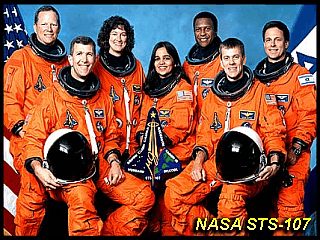
Fortunately, the vehicle occupants most-likely did not suffer during the ordeal. All our hearts and prayers go out to these brave individuals and their families serving our space program. The seven astronauts are shown in the above picture, courtesy of NASA, before the ill-fated STS-107 mission.

On September 11, 2001 the US was brutally attacked by terrorists. This was a very touching and horrid moment far beyond anyone’s worst nightmares. The world trade center was one of my favorite places and I visited there many times growing up. I don't understand how a group of people can take so many lives and destroy something so breathtaking. I myself was in New York just a week prior to this day - I was even preparing some pictures of the downtown NY skyline for this site while this attack was occurring! My heart goes out to all the victims and their loved ones from such a senseless and horrible act of terrorism.
The brutal compilation of pictures below shows the terror that gripped our nation that horrible morning. The pictures are from CNN and its affiliates. The NEXRAD radar image on the left shows the attack's smoke plume streaking southeastward during the pleasant cool weather on that fateful morning. Below the main image compilation is a satellite image of the smoke trails.
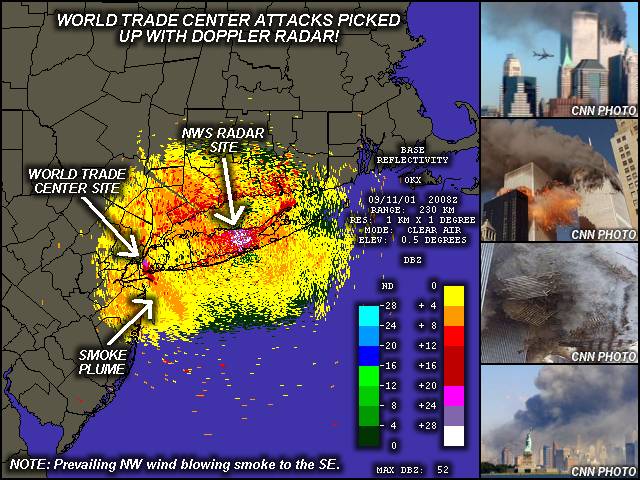
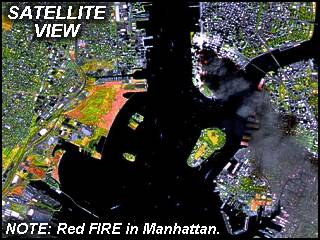
In addition to these attacks, the US economy remained in bad shape for years afterwards. This faced US citizens who were not directly affected by the attacks with layoff from their jobs, financial insecurity, social problems, lost investments, reduction in travel, careful spending, and even increased crime / fraud rates. The animated US flag will fly on this page until JUSTICE is brought to the individuals WHO inflicted this APALLING and unacceptable terror on this country.
We all have heard the expression: "Once broken, it will never be the same again." Well, that is pretty much the main idea how events such as a terrorist attack is intended to work on a country. This little section brings forth the grim subject on the lingering effects of the attacks on the United States back on September 11, 2001. If you, friends, and / or family were fortunate enough to not be DIRECTLY affected by the terrorism you may face what many innocent Americans have to deal with, such as unemployment, financial, even retirement problems.
First of all, what exactly is TERRORISM? Terrorism is a violent or retaliatory action committed by an individual (or group of individuals), usually with some sort of political reason, aimed to disrupt a nation's (or part of a nation's) way of life. A terrorist group can be an individual, such as a bomb planter, or a highly organized group of terrorists such as the "Al Qaeda" and "Taliban". Often terrorist groups threaten a country to get a political need satisfied by either "scaring" or in extreme cases "acting out" their threats (example: crashing airliners, bombing government buildings, etc).

Such an unthinkable and horrific scenario played out on that fateful morning of September 11, 2001. This was a "worst nightmare" act of terrorism committed by the Taliban terrorist group with Osama Bin Laden as the group leader. Four amateur pilots, on a "no-way back" suicide mission, also Taliban members, hijacked four jet airliners loaded with fuel. One was driven into the Pentagon building in the Washington D.C. area. Luckily, the section of the pentagon the plane impacted was closed for renovations. Another airliner crashed outside of Camp David, possibly mitigated from hitting any "strategic" target by a struggle on-board. The other two jet aircraft, the most horrific of the attacks, slammed into each tower of the World Trade Center near maximum level flight speed (350-500 MPH, or more) in New York City. The subsequent kerosene (Jet-A) fuel fire weakened the structure of each building and both catastrophically failed. The intent of this attack was to show the US that the Taliban "means business" and to disrupt the American (or "western") way of life.
As expected no one on any of the airliners involved survived, and loss of life exceeded 5,000 people in New York alone along with many more injuries, some involving permanent disability. Many buildings around the World Trade Center, or WTC, were also damaged or destroyed. The loss of life and property like this is usually called the PRIMARY EFFECT. With the primary effect aside, the SECONDARY EFFECT is the long-lasting damage caused by the attack such as the affect on people and businesses physically away from the primary area, social problems, even mental awareness that it could "happen again" (fear) or "know what we are dealing with". The New York Stock Exchange, or NYSE shut down for over a week after the attacks. Most major US and world financial institutions, also near Wall Street in New York, also shut down temporarily. Air travel was halted by the FAA for almost a week, and restricted use aircraft, such as crop-dusting and air tour / charter services were halted for up to a month! This caused a MAJOR disruption in US (and even foreign) commerce and business, and was a big blow to a good (but unstable) economy at the time.
For the period following the primary and secondary effects, a long clean-up of the damage began. The US military stepped into full gear with air patrolling, plus campaigns in the Afghanistan area to pick-off the Taliban members, especially Osama Bin Laden, the leader. Another problem was the city of Baghdad and another corrupt individual, Saddam Hussein. A campaign was launched to capture this individual because he could also harbor terrorists and is capable of launching an attack against the US. Hussein was just recently captured alive in late 2003 by US troops who stumbled across his bunker. Bin Laden is still at large as of early 2004. As you might imagine, these military campaigns cost money, lots of tax-payers money ... Another chip in the US National Debt.
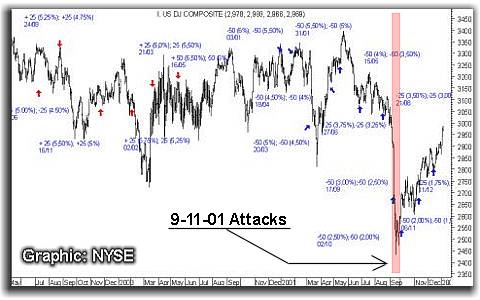
In 2002 the US economy began a rapid down-spiral, with repeated "crash conditions" in the NYSE. For example, before 9-11-01, the DOW (Dow Jones Industrial average, used as a "gauge" to the stock market assets) was over 11,000. In 2002, it was as low as 7,500. Many airlines went bankrupt from lost sales (during the "no-fly" period or after when fewer people were willing to go on any airplane), or had major cut-backs in flights and personnel. I personally lost my job at a company that supplied metals to airline maintenance and manufacturers. This was right after the "best year" in the company's history, until 9-11-01, and that all changed ... I, of course, was not the only one. Many jobs all over the US were forced to fire or lay-off personnel. Hiring freezes and budget cuts prevented new jobs from being offered. Meanwhile, corporate fraud was on the rise (such as the Enron and Worldcomm scandals) and consumer inflation began making itself more and more obvious. As of late 2003, the US economy is finally beginning to "pick-up", but the process is slow and delicate. This "slow-down" of the economy is known as a RECESSION.
You are probably wondering why people in American just don't "try to go forward" and "forget about it all"? Well, we are trying diligently to do just that, president George W Bush was continually trying to balance military activity and the US economy on his shoulders, along with dealing with a major war in the Middle East (Baghdad and Afghanistan), even his worst nightmare of the terrorism itself. Imagine having these responsibilities, imagine the stress, imagine going home to your family every day with that on your mind. Now, what if your closest family was lost in the attacks? Imagine a windowed wife with a minimum wage job where most of the income was supplied by the husband, who was killed in the WTC. Imagine losing your job, not being able to find another one ... opening the mail-box everyday only to find statements and bills, most of which have rates and prices that keep going up. Imagine working in aviation as a big pilot for 15 years, then suddenly being out of work for over a year. Imagine losing your "dream job", and have to take a big pay cut at the only other job you can find. Imagine losing your house, having your car re-possessed, declaring bankruptcy, having good credit turned bad. Imagine not being able to buy a car for years, because of such a credit rating. This is all besides the social problems all this causes, like you getting divorced or dumped by a "co-dependant" spouse or partner, or a relationship getting destroyed through mis-understanding / arguments because of the stress ... I have seen all of these depressing events, even today, all because of the terrorism years ago.
The US economy is basically a highly involved structure of commerce and services. It is like the weather, you affect one area of it, and another, seemingly un-related area gets affected more. For example: A couple plans to buy a boat, which will cost $300 a month to finance. The couple is in good financial condition so this will not be of any concern. Suddenly, the wife (or husband) loses their job. Luckily, they decide to forget about the boat and cancel the order from the dealer. In addition, the couple starts having money problems because of the poor job market. They cut down on things ... Refinance their house for a lower monthly payment (interest rates lower during a recession), sell both cars (payments total $700 a month) and get one instead (at say, $500 a month). This in turn cuts rates on their auto insurance from say, $250 a month down to $150. This all looks good because the couple is saving nearly $1,000 of less important / luxury expenses. What is not good here is that this is silently damaging the US economy even more, and is referred to as REDUCED CONSUMER CONFIDENCE (people don't want to spend money). Let's look at the boat dealer, they just lost a boat sale because of this. That could lead to a job being cut at the boat manufacturing company, and a similar scenario happening to that employee, and so on! This is called the TRICKLE-DOWN EFFECT, where a seemingly harmless event in the economy can cause a large chain of events (no boat, couple saved money = no boat sale, boating company suffers, person at boating company gets laid off, that person also refrains from buying a stereo, the stereo company suffering a lost sale, and so on). Get the picture?
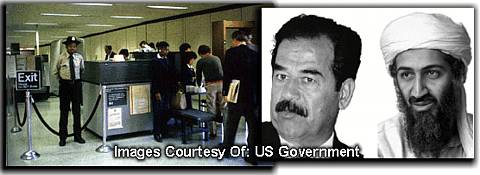
As you can see, the US economy is a complicated and highly fickle entity. The terrorist attacks on September 11, 2001 sure took their toll on it, unfortunately, as intended by the terrorists (they want to make the US a "miserable" place to live). One major course of action that can be done about the economy is to INCREASE CONSUMER CONFIDENCE. This can be done in two ways, lower prices, such as "tax holidays" (that actually has been done), or even better, create more jobs. Simply lowering prices will cause a temporary reprieve in a recession but most likely won't stop it. A "tax holiday" for example, may put more money in your pocket, but less money in the government's pocket. Remember, our defense department (military) is funded on tax money. Creating more jobs will increase both consumer confidence and commerce. More new businesses will be produced, and more money will be in the pocket of the American, while there is little impact on the government's financial condition. In addition to the consumer issue, a second course of action is to mitigate another terrorist attack. One major factor that "dented" the US economy was that many people felt "unsafe" on an airliner. The US government has placed many new techniques for security at airports and on airplanes. Remember, fewer people fly, fewer tickets purchased = Airline carrier goes bankrupt, people are fired or laid off ... The TRICKLE DOWN EFFECT does indeed apply here too! Remember when you check through security at an airport, its a hassle, you have to take your shoes off, check in earlier, pay more for heavy baggage. The person sitting in that window seat next to you on the airplane can even be a trained US air marshal ... But remember, you need to treat these people as your "friends". There were many terrorism threats after 9-11-01, none of which came to fruition in the US, thanks to the professional expertise of our military and department of defense. You are a lot safer on an airline now than ever before. Both prevention of another attack and re-storing the US economy are crucial to help us back to a stable level.

With the terrorist attacks of 9-11-2001, one wonders the force of impact an entire jet airliner would have. The planes used during the attacks have been called "missiles" by many news outlets. Indeed, a jet airplane at speed, can be thought of as such.
The equation above is the formula for kinetic energy (KE) which is measured in Joules. The velocity (V) is squared (multiplied by itself as denoted by the little superscript "2" above the "V". The velocity is also metric and in M/S (meters per second). Mass (in KG, where a kilogram is 2.2 pounds) is denoted by M. The product of mass and velocity squared is divided by "2". The equation is derived from integrating the change in position (distance traveled) per unit of time (differential) thus forming the square and divide by 2. This equation will be used in the examples explaining energy of impactors (hitting something at speed) below.
Let's consider the kinetic energy of a bullet. A 9mm bullet slug, a popular size used in many handguns, travels at a speed of about 1,500 feet per second (about 1,023 MPH) and weighs just under 9 grams. In metric and converted for the formula above, the mass (M) is 0.009 KG, velocity (V) is about 455 M/S. The equation yields a kinetic energy of about 932 joules (J). In another formula, to be used in comparison, is for the SAME amount of kinetic energy (KE), uses a bowling ball (averages a bit over 5 KG) hitting something at about 20 M/S (about 44-45 MPH). Obviously, besides the "flesh cutting effects" of a 9mm round hitting someone at 445 M/S, this will literally "throw" a person to some extent. A person wearing a bullet proof vest will feel the impact as is someone threw a 10-12 pound bowling ball and hit him (or her) with it from a car going nearly 45 MPH! Stepping up in mass (M), let's consider an (average) person in a car going about 55 MPH. The person weighs 175 pounds (just under 80 KG) and 55 MPH is roughly 24 M/S. Using the formula, the person would have a KE of about 23,040 J. Now lets say a semi-trailer, weighing 20,000 pounds is moving alongside the 80 KG person. This truck, with a mass of about 9,032 KG (there are 2.2 pounds to a KG) will have a KE of 2,601,000 J. Now, that same 80 KG person is on a jet airliner going 575 MPH (255 M/S). If you work out the equation, the KE of that (seemingly) small mass of than person is ALSO 2,601,000 J!! Because of the velocity-squared (kinematic formula), a small mass moving at very high speed can have the same energy as a much larger mass moving at a slower speed, but it takes a much smaller increase in velocity than a larger increase in mass. This is how a person sitting on a routine flight aboard a sub-sonic jet airliner at 30,000 feet going 575 MPH can have more energy contained in his (or her) body's mass than an 18 wheeler going the speed limit on most Interstates!
In yet another comparison, the same 80 KG person in earth orbit at 17,500 MPH (7,777 M/S) would have roughly 2,419,269,160 (2.42 GIGA) joules of energy! This is roughly equivalent to 930 18-wheelers (weighing about 10 tons each) traveling at 55 MPH - or, if you read below, almost 3/4 of the kinetic energy of one of the planes what hit the World Trade Center on 9-11-2001!

What about an entire airplane? Unfortunately, 9-11-2001 illustrated the results of a high mass and (relatively) high-velocity impactor. A Boeing 767-200 was used in one of the strikes on the World Trade Center in New York City. An "empty" 767-200, which we will look at here, ("empty" meaning no fuel and people) weighs about 176,650 pounds. The 767-200 that hit the World Trade Center was a trans-continental flight from Boston, MA to Los Angeles, CA. It was loaded with fuel and full of passengers, so the weight would be about 310,000 pounds (maximum takeoff weight is 315,000 pounds, but I took off a little here for fuel burn during the short 26 minute flight time to reach New York City after being hi-jacked). The mass of this 767-200 would be about 141,000 KG, give-or-take. Both planes (a 767 and 757) were slammed into the buildings at near full sea-level static thrust, and at speeds anywhere from 350 to over 500 MPH (some reports have 570 MPH, but I will be "generous" and put it in at 500 MPH).
Plugging in the mass of 141,000 KG and a speed of 500 MPH (222 M/S) into the equation, a kinetic energy of 3,481,481,481 (3.48 GIGA) joules is calculated from each plane. This is about the same energy that would be released if 1,650 sticks of dynamite were detonated simultaneously. If this still does not provide any perspective on how much energy this is, 3.48 GJ (3.48 billion joules) will power the average home (consuming 5,000 watts) for almost 8 days, or a keep 100 watt light bulb continuously for over a year plus one month.
The force on the building near the 77th (or 93rd) floors of the World Trade Center (near the impact site of the airplanes) would have been equivalent to 1,650 sticks of dynamite going off in someone's office. Believe it or not, this would NOT be enough to blow the building in half, since there is much steel and re-enforced concrete involved. However, having many of the supports partially damaged or destroyed, the structure WAS weakened. The high temperatures from the subsequent fuel fire caused "viscoplasticity" (where steel softens and bends much the same way a blacksmith does by heating iron) which caused the catastrophic failure.

How about hitting water at high speed? Have you ever heard the expression "like hitting concrete"? Unfortunately, and quite frankly, a high speed water impact IS hitting "concrete", period. Anyone who dove off a high dive board (averaging only 10-15 MPH) and hitting the pool the wrong way can attest to this. A suicidal jump off a high bridge, such as the Golden Gate Bridge, your body will impact the water at over 70 MPH (250 foot fall) and with about 30-50 times the kinetic energy of a high-dive board. Normally, damage to internal organs causes death, and survival is very unlikely. In the pictures above, a jet aircraft impacts lake Ontario off Toronto at speed with devastating results. The water impact is so violent that pieces of the disintegrating plane can be seen flying in addition to the spray plume! Only 4 feet of water can stop a bullet from a handgun. At higher speeds, a bullet breaks apart and deforms, and the distance decreases to 3 feet. The main rule of thumb is that the faster an impactor hits a fluid medium (such as water or liquid, or even a gas such as air at hyper-speeds), the harder that medium "tries" to slow it down due to "velocity-squared".
Getting back to the World Trade Center example and solid wall impacts ... At 500 MPH, the time it takes between the nose of the plane "hitting" the wall and the tail "going in" would only be about 1/5 of a second. This is a distance of about 159 feet, and would have been "consumed" and disintegrated in about the same time it takes to blink an eye. The plane that hit the south tower was traveling faster at impact than the plane that hit the north tower. This caused the south tower to collapse in a shorter time and before the north one, even though the south tower was hit after the north tower.
Fortunately, no one on any of the airplanes involved in the World Trade Center and Pentagon impacts would have felt any pain or even witnessed the impact from inside the plane as death would have been instantaneous during the disintegration.
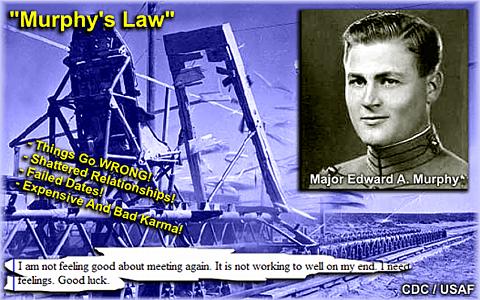
We all have been there one time or another in our lives. You are in a hurry, trying to make an important appointment, and you are stuck in a traffic jam and miss it. A traffic light is green for almost 20 minutes, of course, when YOU come to it, it changes red and you have to stop. Even worse, a rural crossroad where only one car travels on either road per given day has more accidents in a given time-frame than the busiest intersection in New York City! Notice that when traveling and having a connecting flight the first flight is ALWAYS delayed so you wind up missing the connection, never the connection being delayed? Ahhh, Welcome to MURPHY'S LAW, and no one is safe from it!

It is so typical. You go to the store, and each shelf is stocked to the limit with goods - But the one item YOU are LOOKING FOR is the only item missing! Once again, Murphy scored another one against you! Besides bad luck, shattered relationships, frustration, and being late - Murphy's Law is a REAL THING, and originated from a very real and practical place. If you guessed the US Military - you are right! Particularly, the US Air Force. Major Edward A. Murphy was an engineer involved in the tests of the ROCKET SLED. This was a high speed rocket-powered vehicle, running on rails, and braked by a water-scoop designed to inflict unimaginable G-Force loads on animal / human test subjects (Colonel John Paul Stapp being the most notable candidate for this project). Murphy noticed that trial runs of the vehicle failed as connections were accidentally hooked up backwards, regardless of how many times they were checked and re-checked. Frustrated, young major Murphy coined the use of the term "Murphy's Law" for the first time in 1948.
So the next time you hook a battery up backwards, and burn out a costly device, or take a true and false test and "guess" the answers expecting to get "50%" and only wind up getting "10%" - Think of the rocket sled and early ejection-seat testing as major Edward A. Murphy as the sole inventor of the law whose name you keep swearing as you deal with the failure and costly consequences of such a "coin toss"!
Below is a listing of some things and events invented by yours truly, Edward A. Murphy - check them out, and see for yourself how frightengly familiar some my appear!
1. If anything can go wrong, it will.
2. Nothing is as easy as it looks.
3. Everything takes longer than you think.
4. Doing it the hard way is always easier in the long run.
5. Research will always tend to support your theory, if you do enough of it.
6. If success is at first not achieved, every effort will be made to hide the fact that it was even attempted.
7. People who smile when things are going wrong have already thought of who will get the blame.
8. Your superiors will always think they are better than you, despite the law of averages.
9. The truth shall get you fired.
10. If you cannot convince people, confuse them.
11. If everything is coming your way, watch out.
12. If people listened to themselves more often, they would talk a lot less.
13. Trust only those who stand to lose as much as you do when everything goes wrong.
14. The shortest distance between two points is usually under construction.
15. In any organization there will always be one person who knows what is going on. This person must be fired, or at least avoided at all costs.
16. knife too dull to cut anything else will always cut your finger like a razor.
17. After your hands have become extremely dirty, your nose will itch.
18. Leftover nuts never match leftover bolts.
19. In case of doubt, say it loud and convincingly.
20. The length of a minute depends on what your are waiting for.
21. When a man says to you "It's not the not the money, it's the principle of the thing," it's always the money.
22. The number of people who happen to be watching you will always directly proportional to the stupidity of the thing you are doing.
23. Things always get worse before they get better.
24. Bad weather reports are right more often than sunny ones.
25. If it jams--force it. Then, if it breaks, it needed replacing anyway.
26. The first place to look for something is the last place you expect to find it.
27. The driver's side windshield wiper always streaks and wears out first.
28. In human affairs it is impossible to make anything fool-proof, so don't waste a lot of time trying.
29. As soon as you switch lanes, your old lane speeds up.
30. The worse the haircut, the slower it grows out.
31. Phone messages: If you have a pen, there's no paper. If you have paper, there's no pen. If you have both, it will be a wrong number.
32. The slowest drivers all know the fastest shortcuts.
33. When you try to prove to someone that a machine doesn't work, it will always work perfectly.
34. Law of Corporate Planning: Anything that can be changed will be changed until there is no time left to really plan anything.
35. When the world solves one problem, the solution will usually create another problem, far worse than the first one.
36. Progress is the endless exchange of one problem for another.
37. Being punctual only means your mistake will be made on time.
38. 2nd Law of the Corporation: Any action for which there is no logical explanation always is already "company policy."
39. Whatever plan you make, there is a hidden difficulty somewhere that will derail it.
40. A surprise monetary windfall will be accompanied by an unexpected expense of the same or a greater amount.
41. The one emergency for which you are fully prepared will never happen.
42. When taking something apart to fix a minor malfunction, you will cause a much greater malfunction upon reassembly.
43. All great discoveries are made by mistake.
44. If it looks easy, it's tough. If it looks tough, it's impossible.
45. No matter how early you get there, someone else is always there first, or else you've got the times screwed up, or it's the wrong day.
46. The effort of trying to save a falling object by catching it will always cause more destruction than if the object had just been allowed to fall unobstructed in the first place.
47. The most expensive and hard to replace component is always the one that breaks first.
48. No one can ever leave anything well enough alone.
49. If you don't really have to do it, and if doing it or not doesn't matter at all, it will go perfectly every time.
50. As soon as you mention something ... if it's good, it goes away ... if it's bad, it comes upon you immediately.
51. The first 90% of project takes 90% of the time, and the last 10% takes at least twice as long.
52. Inside every large problem is many other small problems struggling to get out.
53. If there are two or more ways to do something, and one of those ways can result in a catastrophe, then that is the one that will be chosen.
54. All work expands to fill the time allowed.
55. There is never enough time or money.
56. The greastest thing about teamwork and study committees is that they can disperse the blame.
57. Whatever happens, look as though you intended it to happen.
58. No two identicial parts are ever truly identical.
59. There is no limit to how bad things can get.
60. When things go wrong, they go wrong all at once, and at the worst possible moment.
61. If everything seems to be going along well, you have definitely overlooked something.
62. Whenever you start to do something, you quickly realize that something else must be done first.
63. The likelihood of success is inversely proportional to how important the project is.
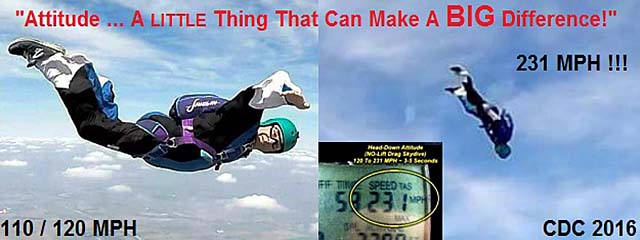
Just like a plane flying high versus crashing - It's all about the attitude (and it's a little thing that can make a BIG difference). In the "analogous" image above, where I am skydiving, a simple change in my body position (also called "attitude" in aeronautics) causes drastic changes in my rate of descent (practically DOUBLING my free fall speed)! The same "drastic" effects apply socially. If you "whistle while you work", you make others around you happy. If you are angry and nasty, you will not only make others around you unhappy, but you probably won't be liked as well. Unfortunately, online interactions - Especially dating and social apps - Have brought on the true negative side of peoples' attitudes.
This is a particularly sensitive (and even disturbing) section, but I decided to put it out there, especially for minority groups, and "men of color" in the LGBT community. Unfortunately, with the advent of mobile computing and ease of availability to data online at a glance, the dating scene also went way of the "instant gratification" and a blatant "yes or no" (and even an "out of the question / how "dare you" type of attitude). I will focus on one particular dating app, called "GrindR", which allows gay and bisexual men to meet with those nearby, based on Geo-location. Keep in mind that this highly unacceptable behavior by members of such dating apps (and web-sites) are not limited to the LGBT community. These issues are across the board, with all lifestyles, genders, and are prominent in North America, especially the United States.
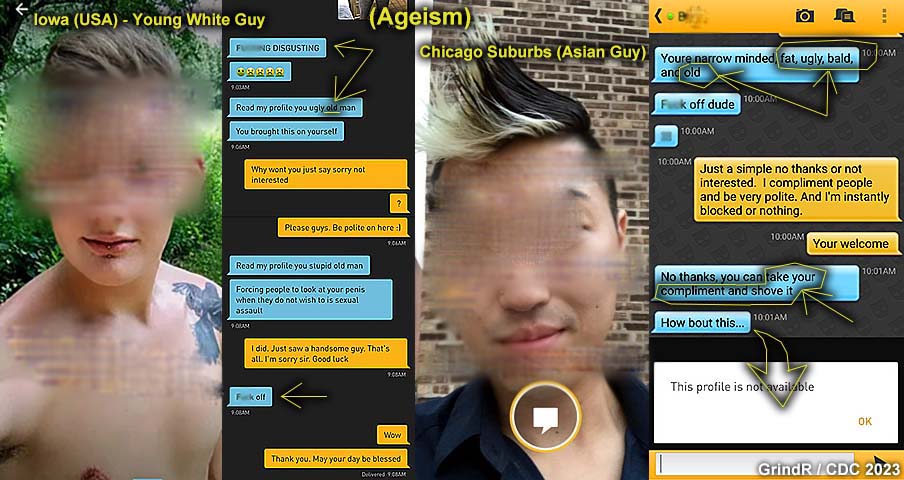
In the image set above, two examples of extreme hate and ageism (age shaming and / or exclusions) are seen based on a person who complimented two people. On the left is a young white man in his mid 20s. He hit up the person (or "victim" in this case), and asked for additional pictures (he had pictures in his profile, and detailed stats about his age, in his 40s, and other characteristics). When the man sent him the photos, the young man immediately flogged back with a nasty attitude, bringing his age against him, and even calling him a "F_cking Old Man", demeaning / rejecting him in a terrible way, when all he had to do was politely decline and say he was not interested. This exchange of words hurt the older gentleman so bad, that he contemplated suicide.
The two images to the right are another case of ageism and hate towards older LGBT and gay men. The victim, also in his 40s, message a young Asian man and did not get a response. The Asian man had a profile saying he was "very friendly" and to "say hello, I 'don't bite'". The victim responded (after not hearing from him) with "Thanks for 'viewing me', handsome". The subsequent dialog is shown in the rather disturbing image to the far right, with accusations about age, fat shaming, being "old and bald", "Take your compliment and shove it...", and after a final "How 'bout this..." phrase, he blocked the victim (who remained polite through the entire "cyber-bullying session"). The victim apparently was getting an oil change when he saw these messages, and threw his phone, breaking it. Again a simple and polite "Not interested" would have made a big difference in the outcome of this conversation.
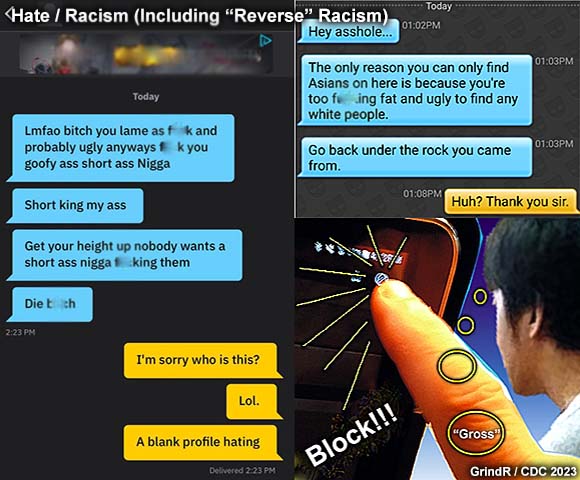
The images above show another example of both prejudice and "reverse" racism as well. In the left image, a conversation is initiated by a white man, with the blue text his messages. The responses, in yellow, are from a younger Black guy, having no idea why he was being singled out, let alone ATTACKED (even taking it to the extreme of dropping F bombs and / or using the "N word" freely). The upper-right side shows a dialog between two white people, and one of them attacking the other simply for having a preference of Asian men in his profile. Sadly, the person (who IS attracted towards Asian men) is blocked and rejected more by them, than those minorities themselves (lower-right). Unfortunately, many profiles on this dating app are also fake, with those who are real posting unrealistic attitudes and / or expectations that they certainly "so not preach" (example: "Say hi, I don't bite", only to "BITE" anyone who talks to them when they have no interest in them and / or simply wants to play games).
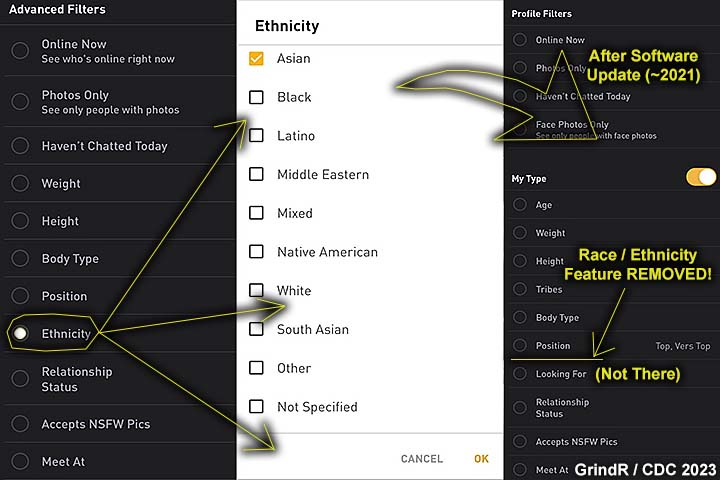
With such hate and animosity towards both minority groups on the GrindR dating app - In addition to unrealistic expectations / fake profiles, the software support team decided to make changes to mitigate the hate and shaming. This was so extreme (in lieu of such atrocious behavior), that software modifications were made (around 2021) to the app to REMOVE the "racial / ethnic" option in their preferences section! This has both good and bad consequences. Yes, it removes the ability for someone who hates Asians, Blacks, etc. to search for those races to cyber-bully them, but also ruins the app for those WHO LIKE men of color! Yes, people actually DO like Asians or Black people, and would use the search to pick those to try to set a date with them. I spoke to a white man who liked dating Asians and he was very upset when the feature was removed, with him having to sift through the entire grid where he would pick and chose the scant few that showed up, opposed to immediately finding dozens of "his type" at a glance before this feature was removed (and, this is before the dreaded "pay wall" - Plenty of Fish is notorious for this as well - Made this even more difficult).
So, in summary, if SO MANY people are hateful on that app - Why just remove the racial search? Why not remove the weight search (yes, there is that)? Oh, and why they DID NOT remove the AGE search? ... That one causes most of the hate - Far more than race. People simply are NOT NICE on this app - Or any other app for the most part. They feel "safe" behind a phone or computer screen, being able to hurt someone, and reject them (while making them feel horrible). In some rare cases, revenge was sought by a victim of such hate / bullying - Ranging from them cussing them out on a second profile on another device (after they were blocked on their main device), to more violent behavior such as using a fake profile to lure people (who rejected them) to a location with physical violence (there have been murders because of this).
These dating apps also can misrepresent information. First of all, not everyone is honest. People lie about their age (including a photo of them 20+ years prior), weight, height, or even race, in their profile - A major consequence of ageism / racism and the fear of being rejected. The age shaming from the younger generations has also fostered a phobia called "ephebiphobia" (fear of youth), and "gerontophobia" (fear of the older). Some apps, like "SilverDaddy" and "GrowlR" (older bears) have similar issues, but in a different sense, with younger people being blocked and rejected because they are NOT "old" and / or "fat"! I will also digress, mentioning that many profiles on these apps are not real - Using either stolen profiles, and / or people collecting pictures to use on other (fake) profiles - Usually when someone sends pictures and they are blocked. Such profiles can be used as lures to illicit porn, gambling, and money (pay to meet) scams. The GrindR app also suffered from many software bugs and issues during it's existence, with the GrowlR app removing many user profiles in early 2020 without notice.
I know people who were shamed and rejected on the GrindR app, and subsequently met the same person (who blocked them) in a bar or club, and one of them is in a long-term relationship (with a person who had no idea he blocked him)! In my opinion I prefer going out in person, and staying OUT of the online scene. Not everything is what it may appear to be. People are the ones that need to stop this behavior - Not changes to any app, filter, or search options. We are all grown ups and need to quit acting like junior high school children. On excerpt from the founder (Joel Simkhai) of GrindR was this: "I don't like it, but I'm not a sixth grade teacher and it isn't my job to police such things".
HTML File "america.htm" - Developed By Chris Collura
To Return To The HOME Page Of This Site Click The "INDEX.HTM" Link Here!